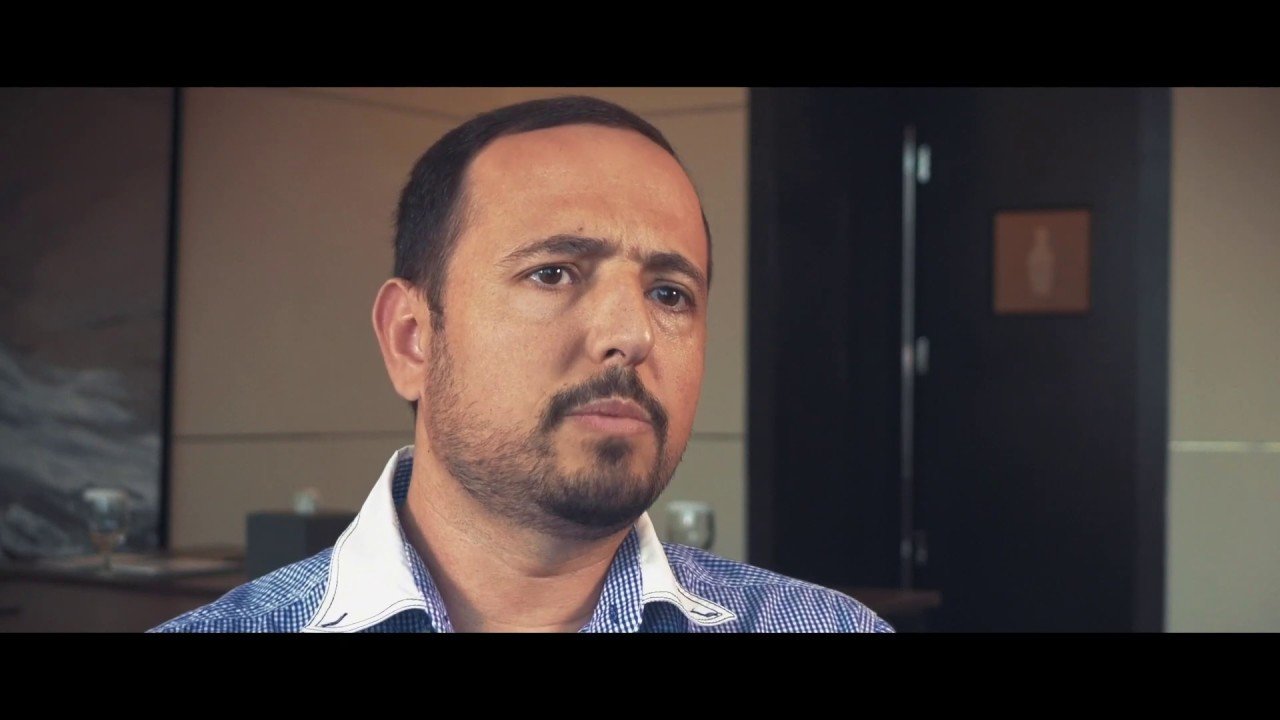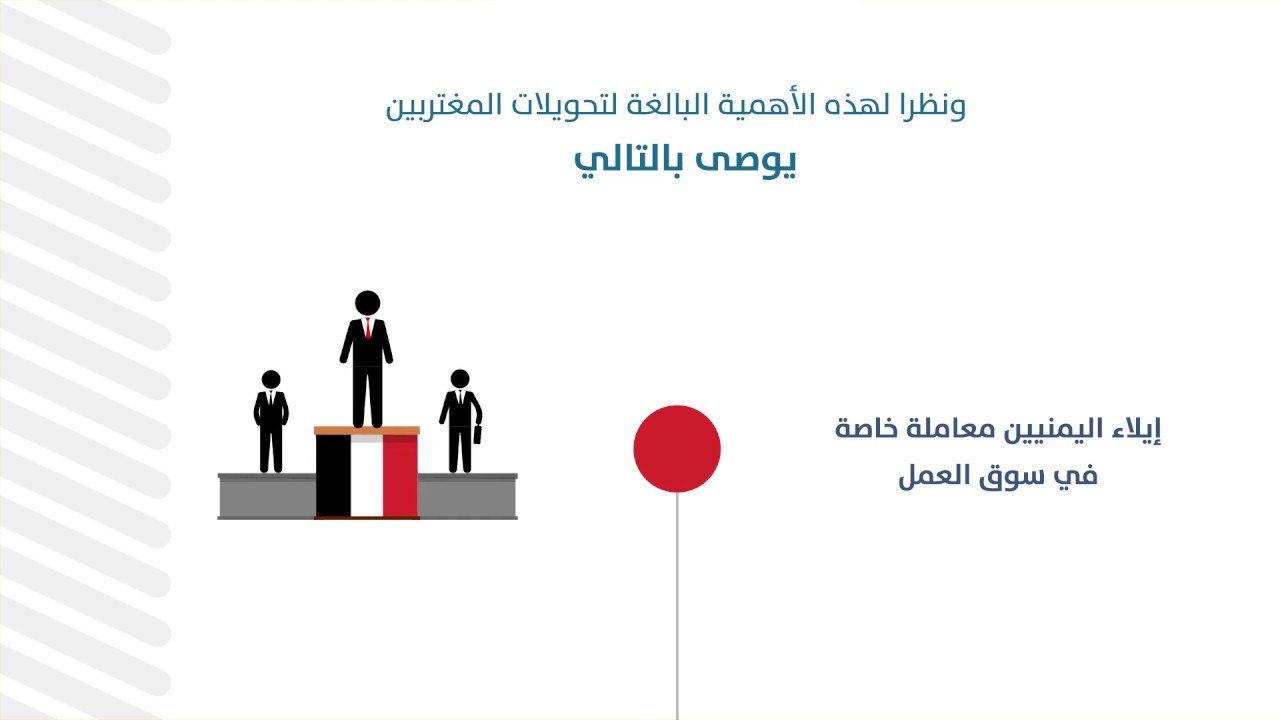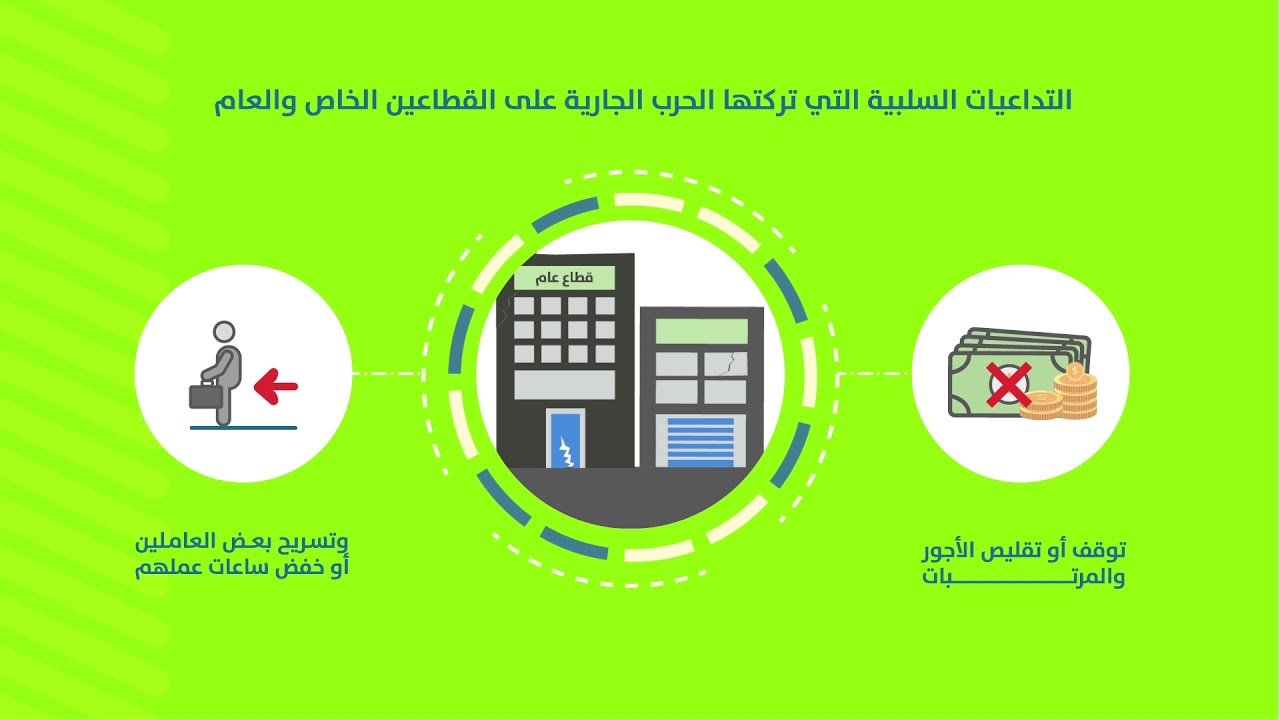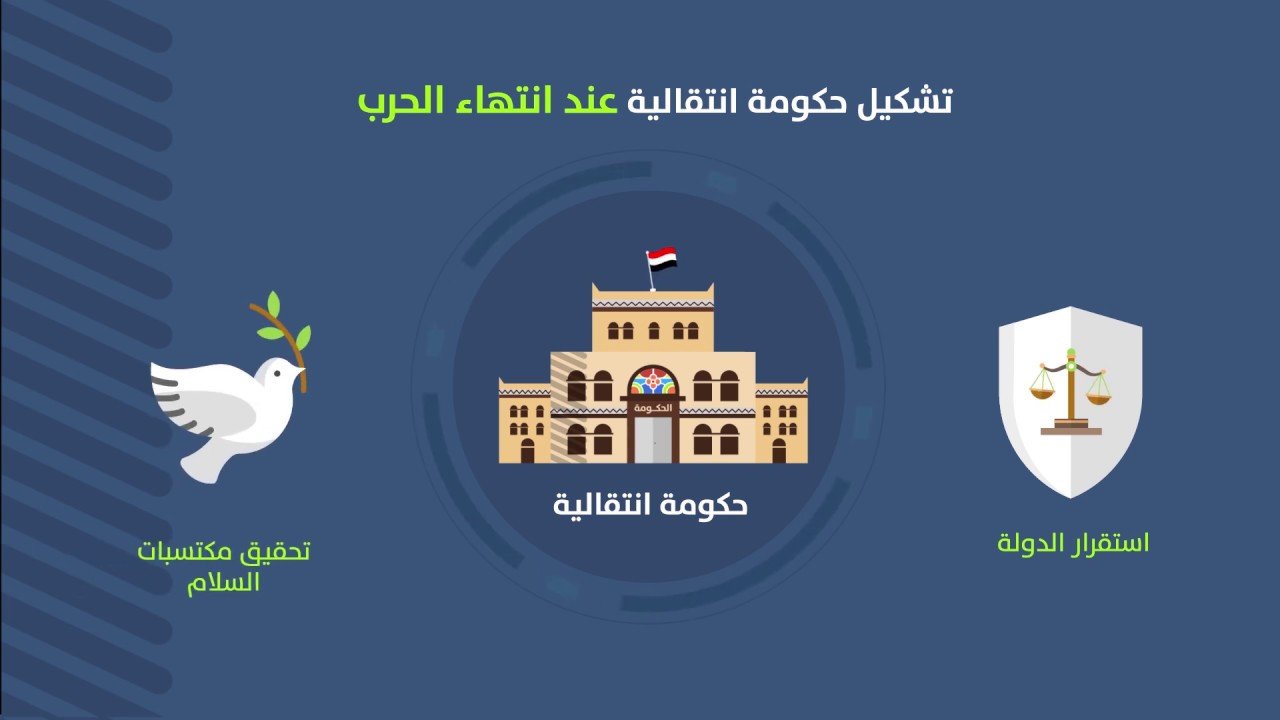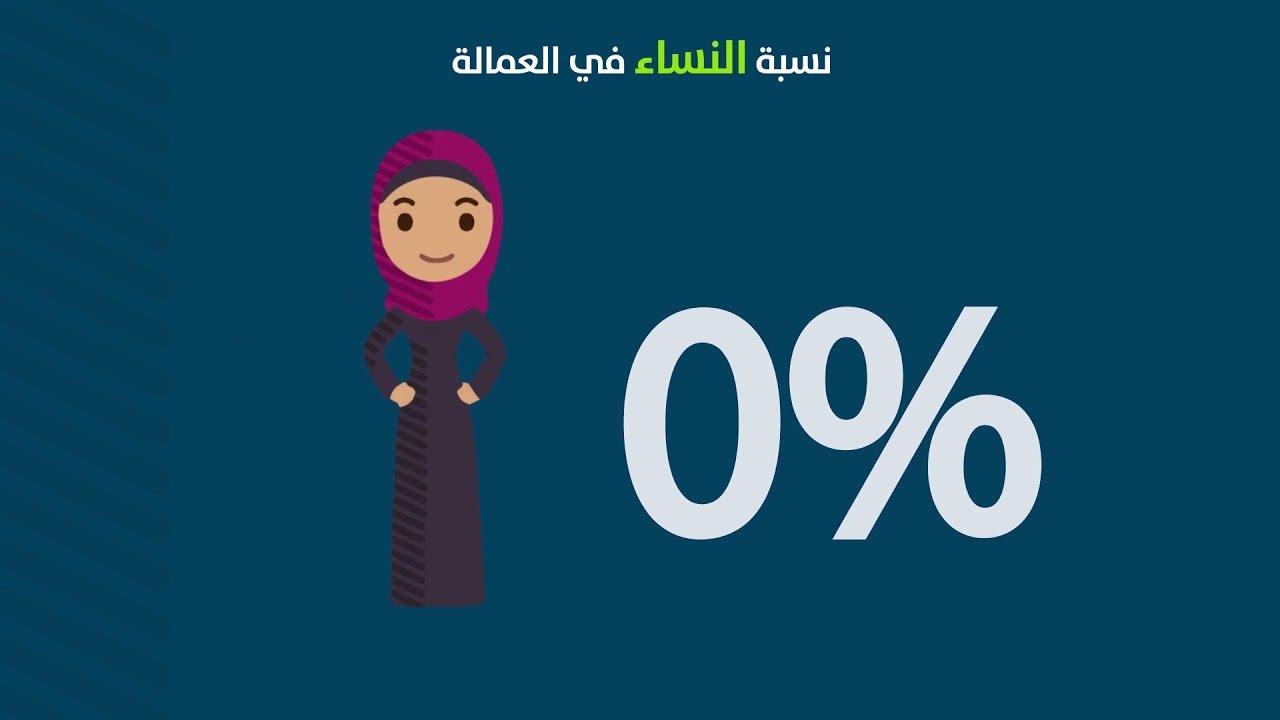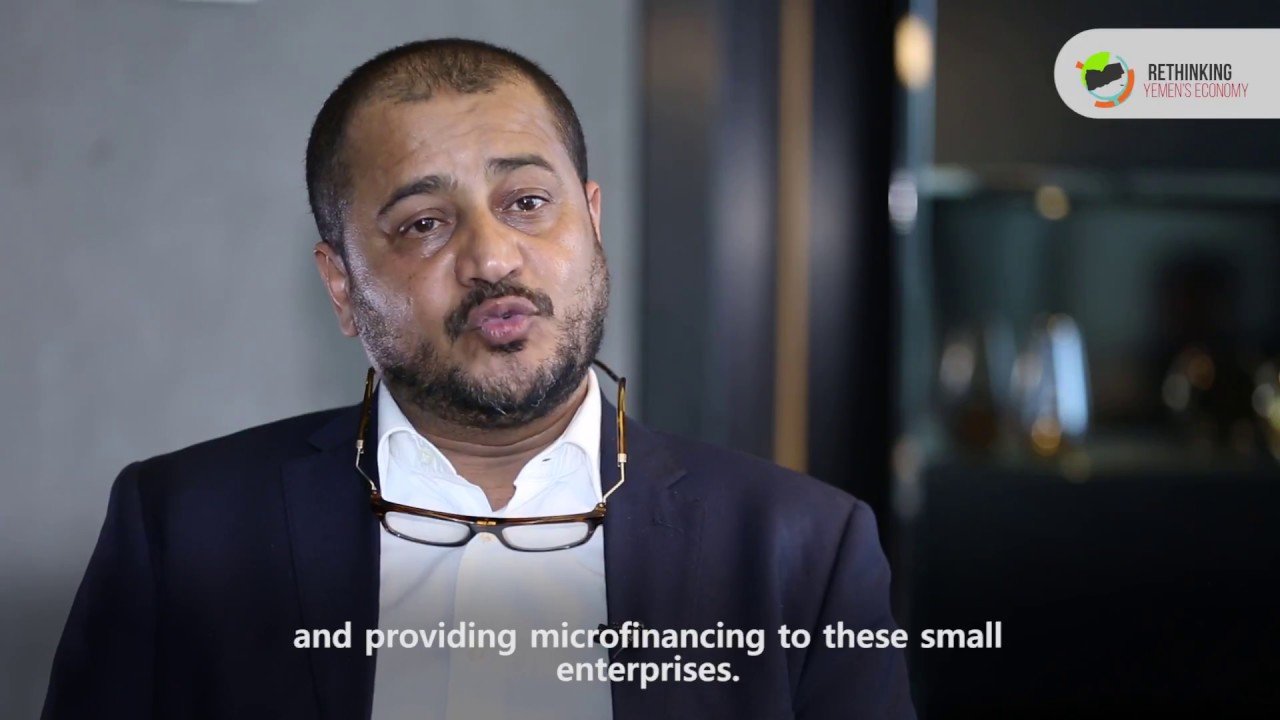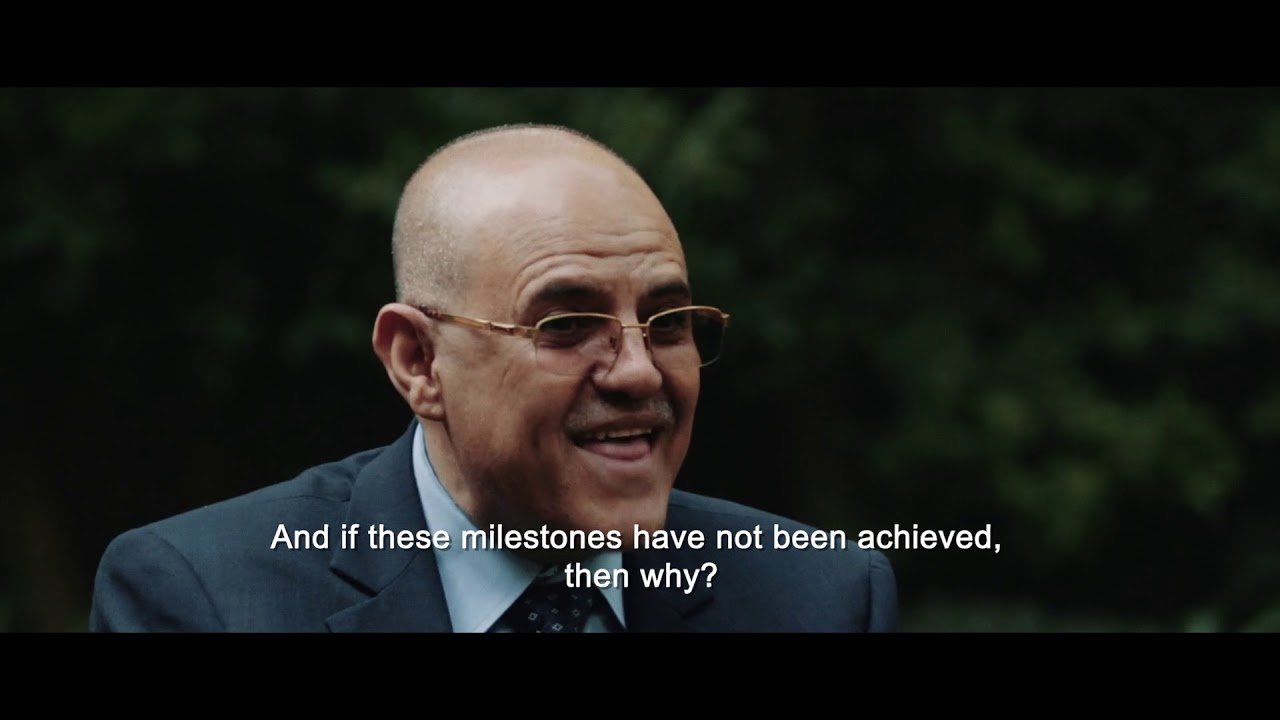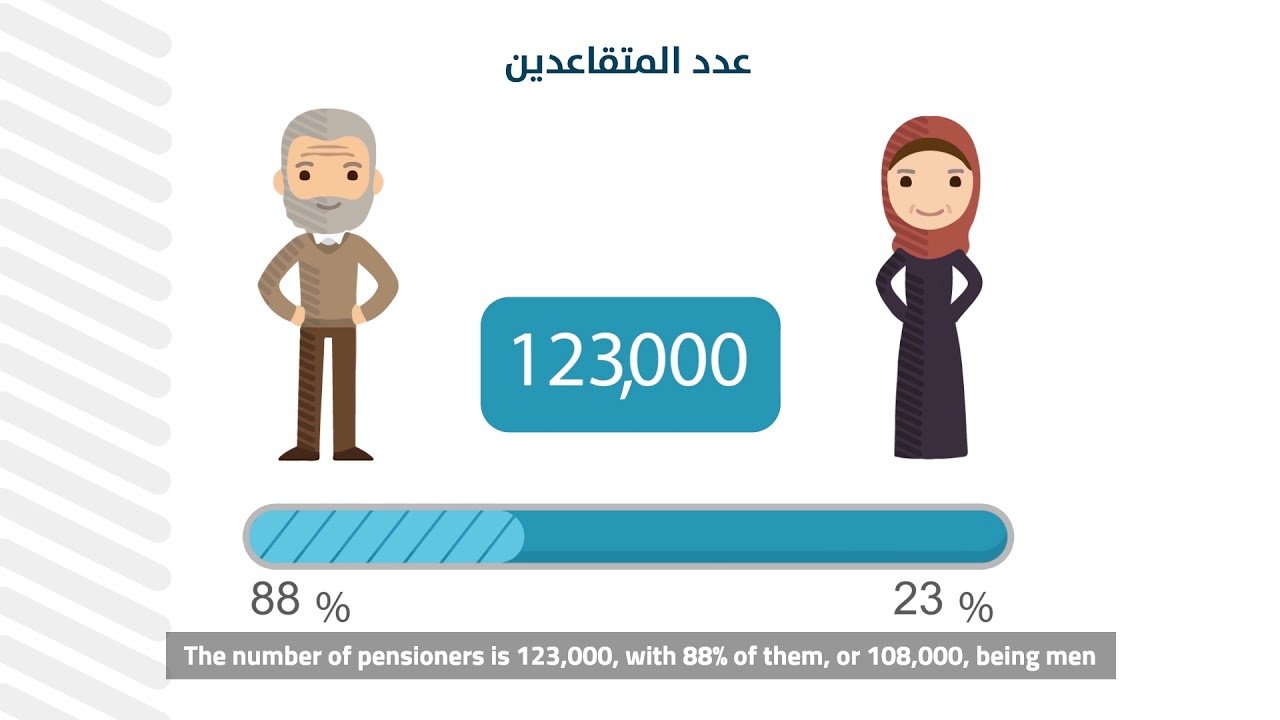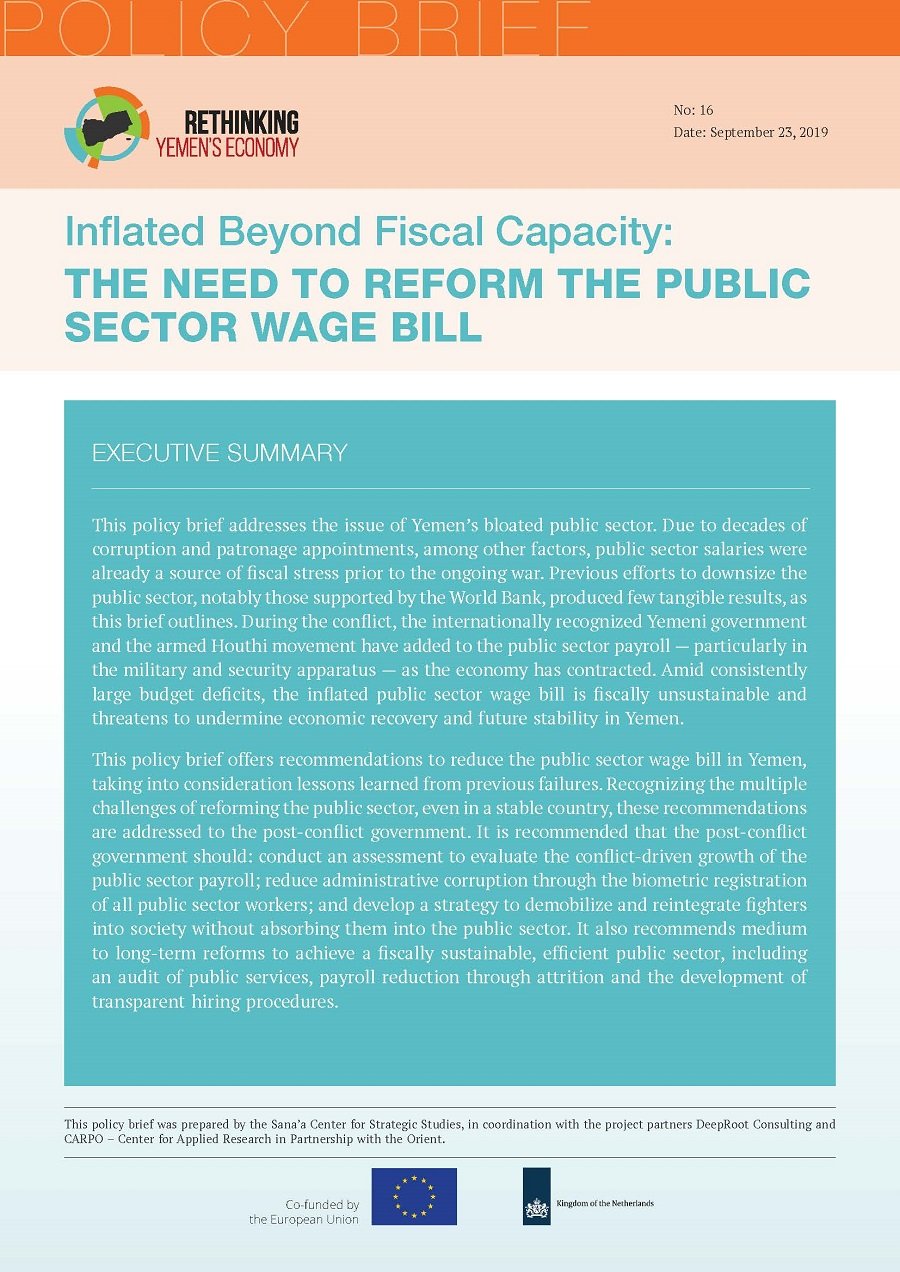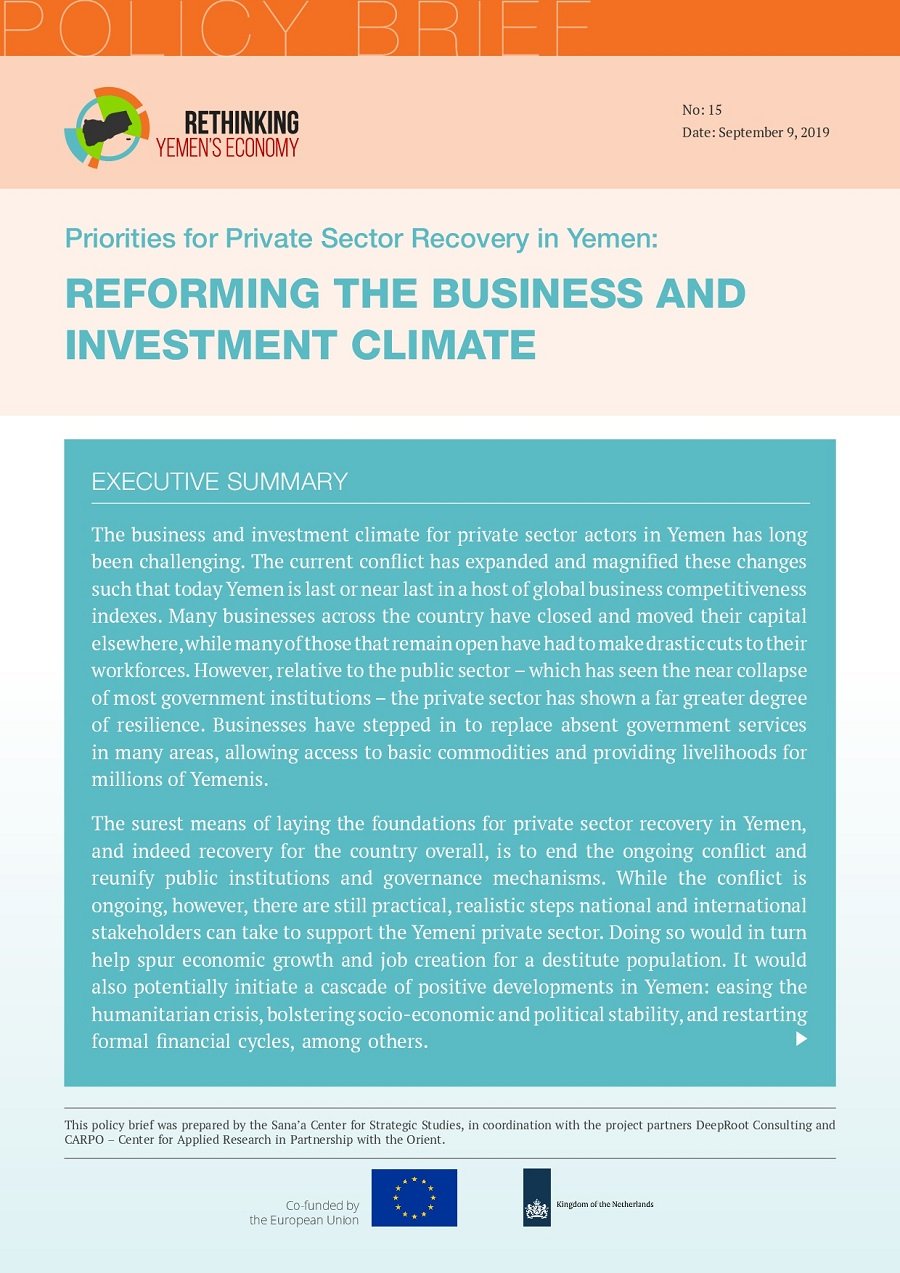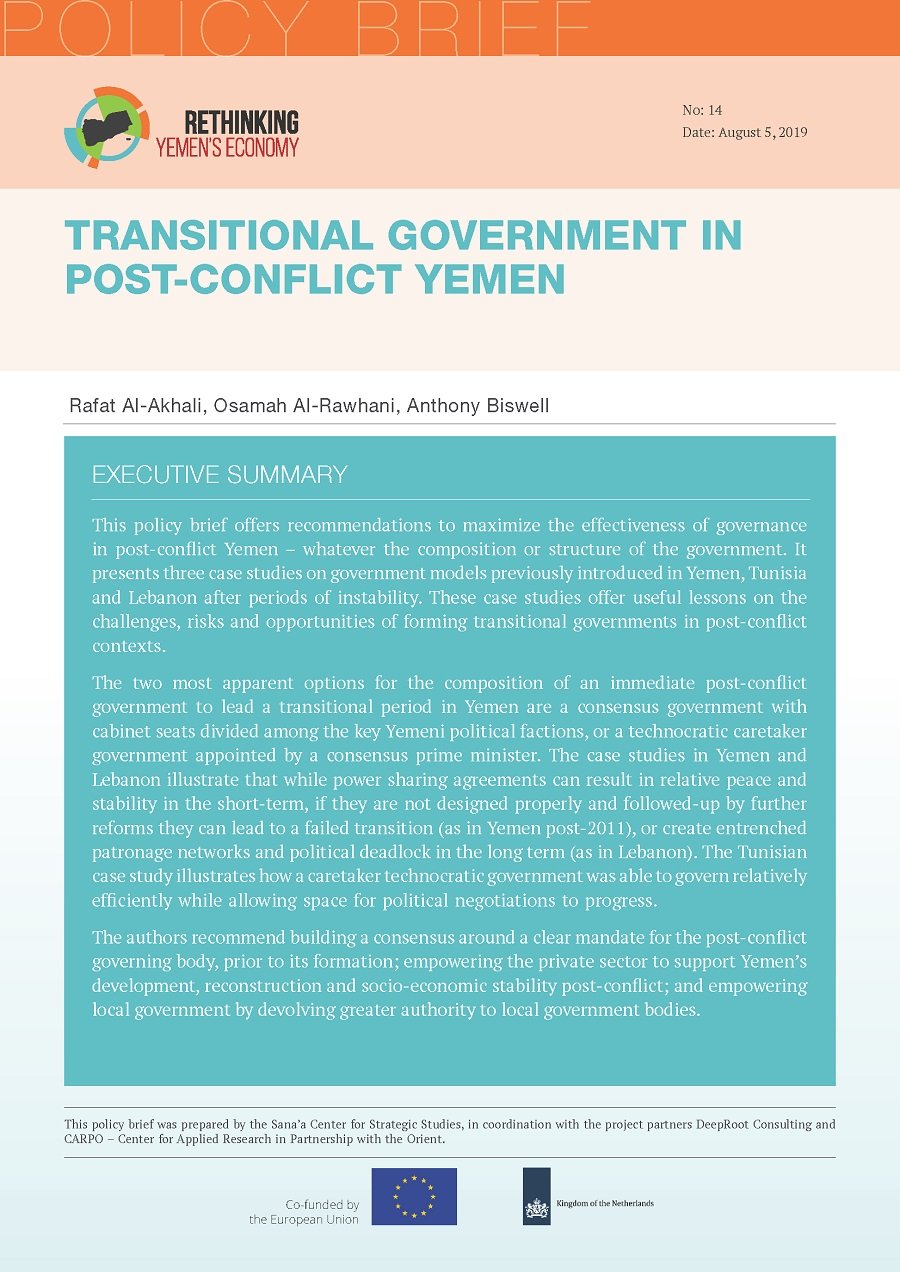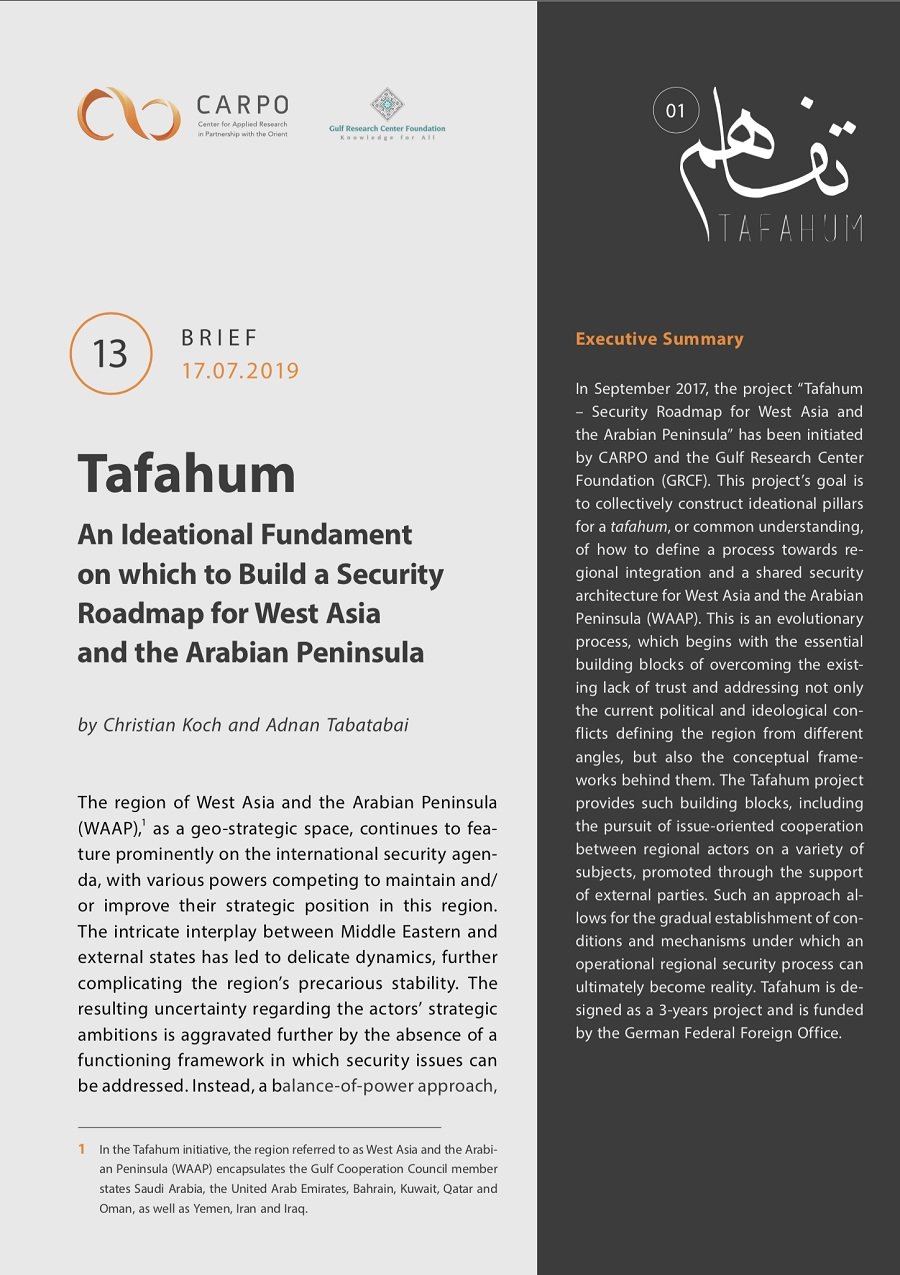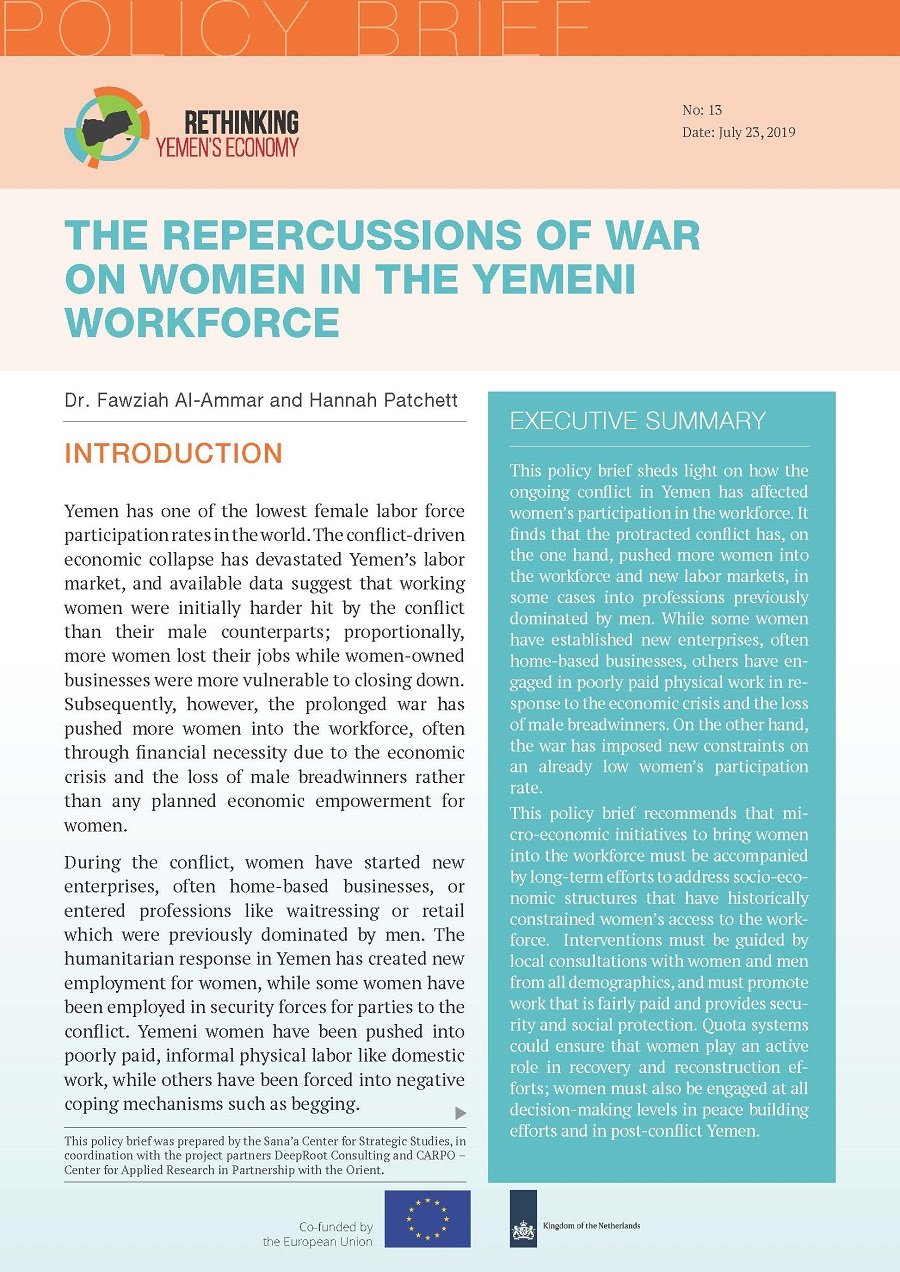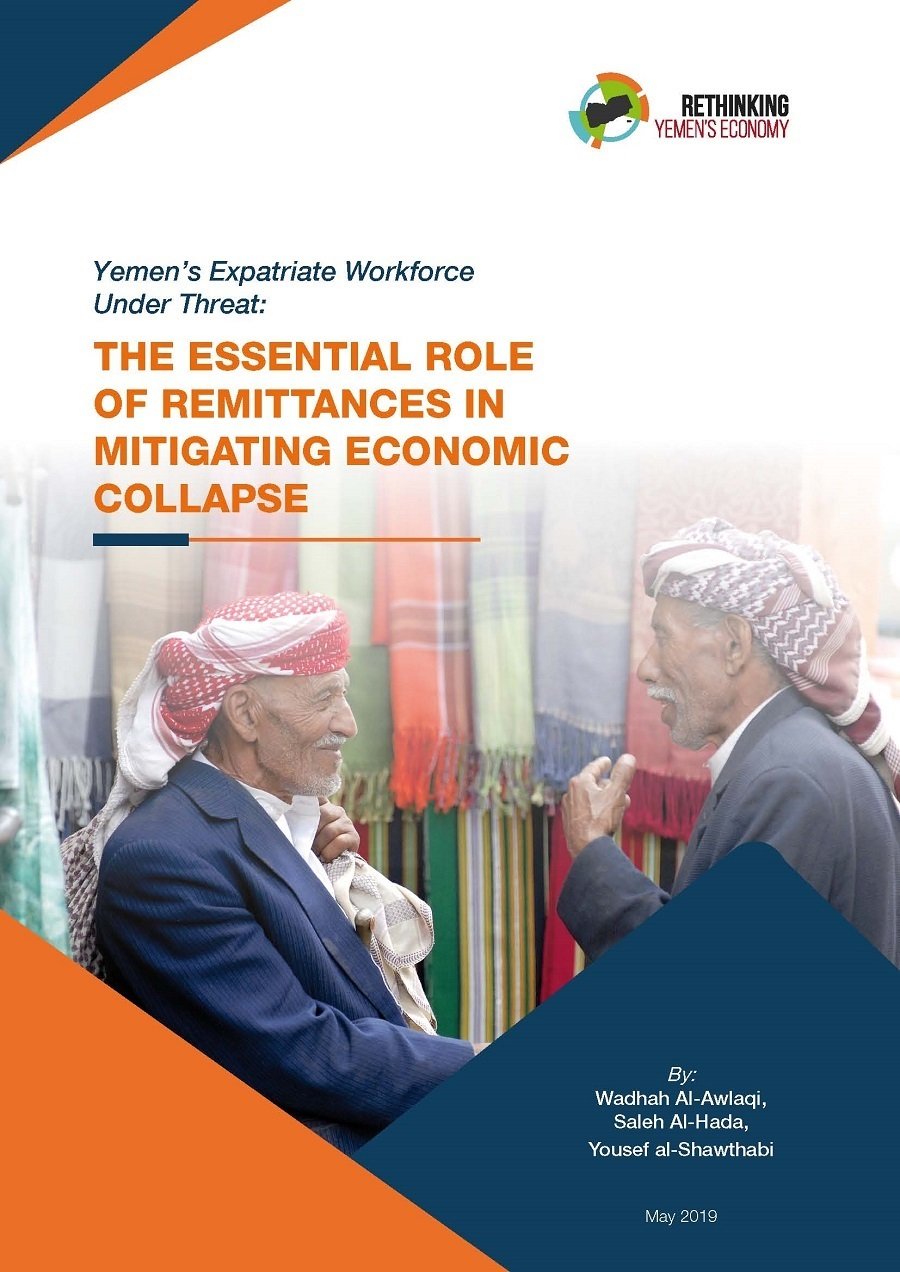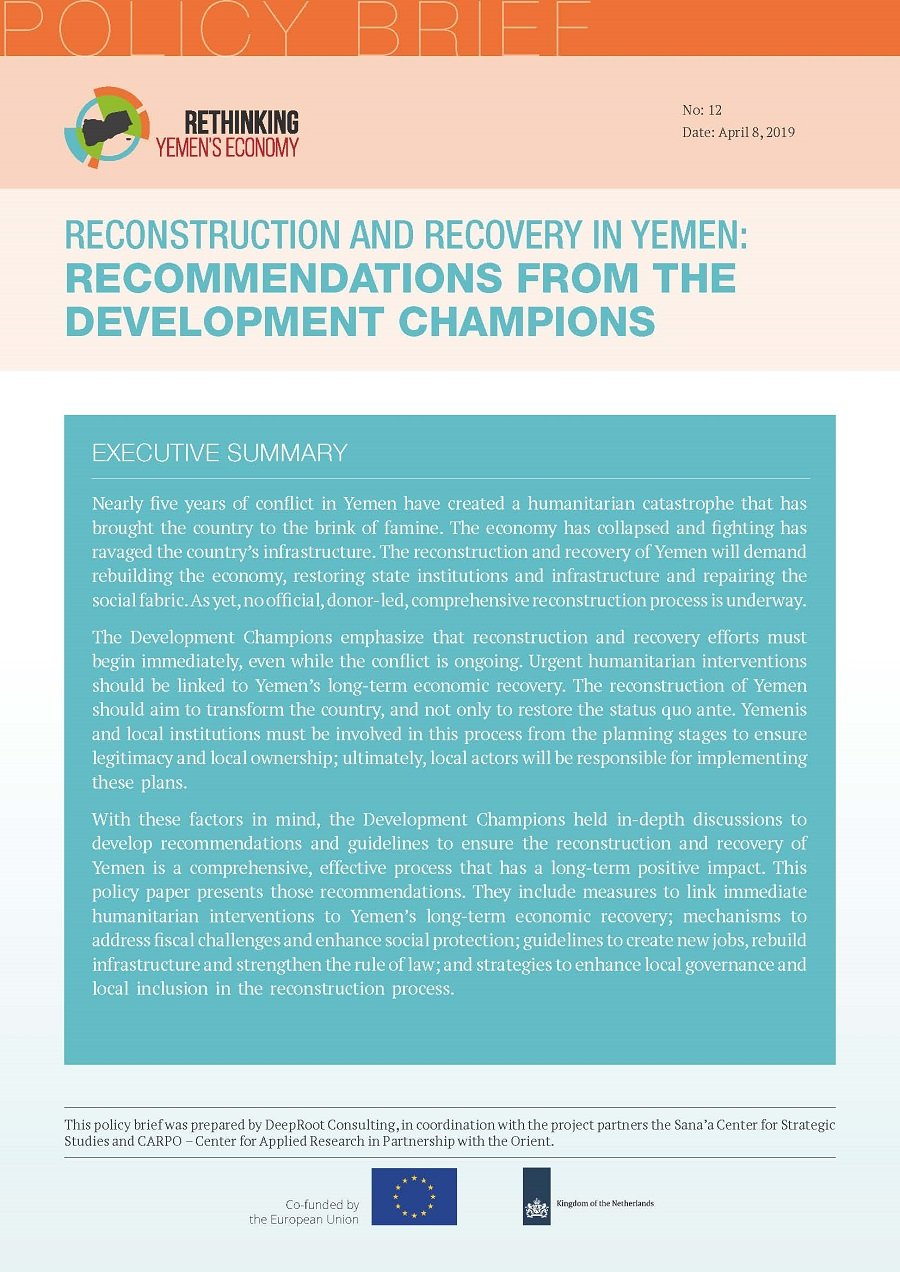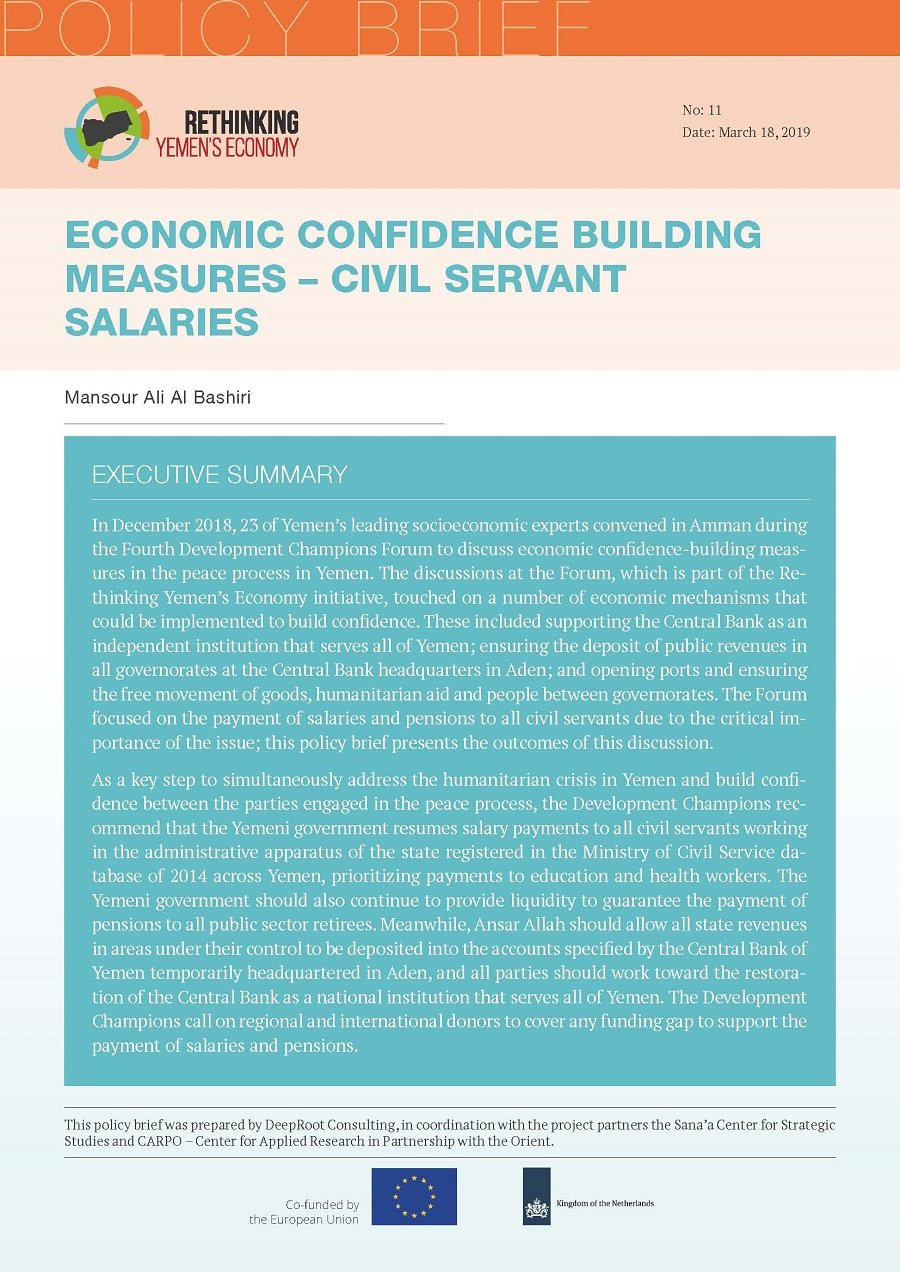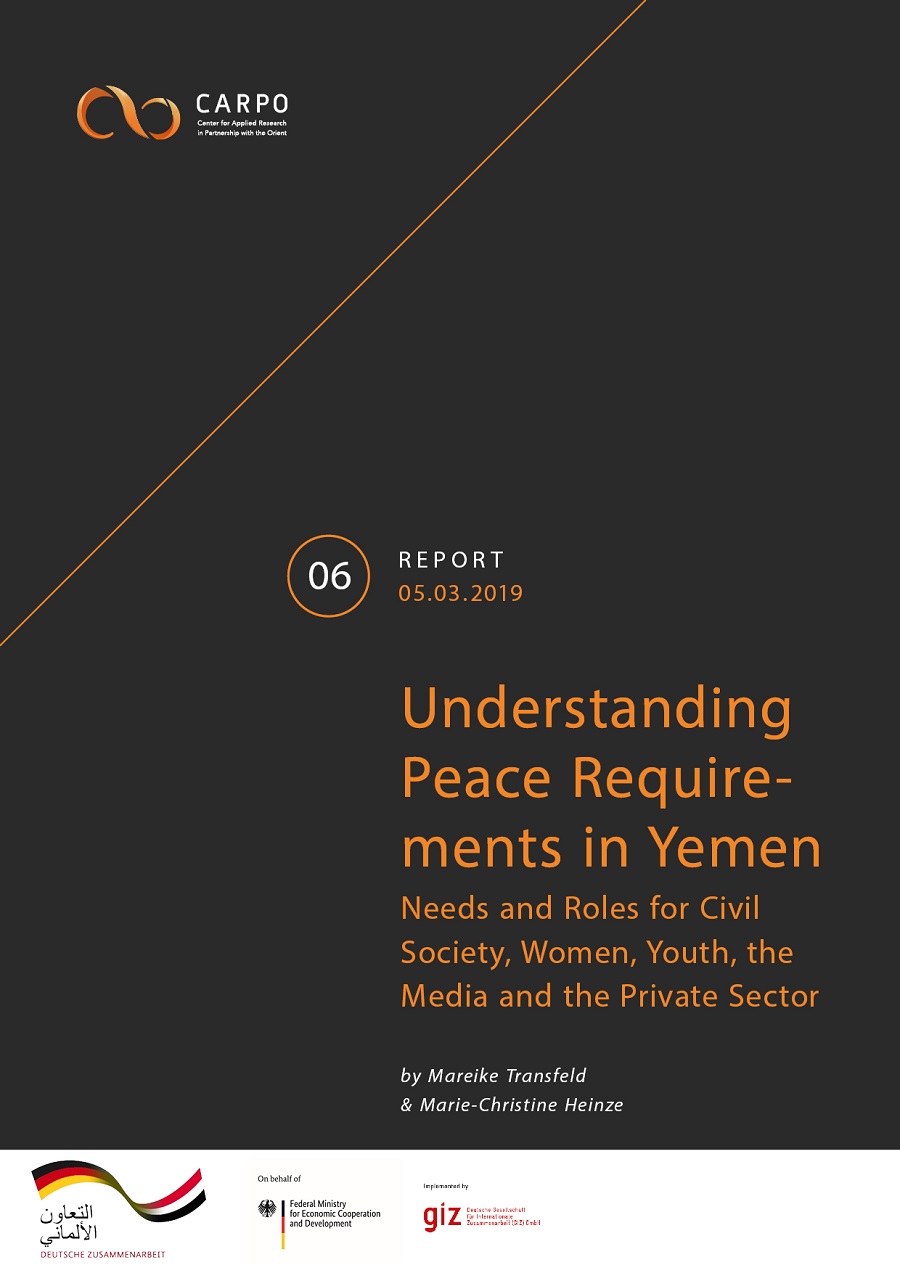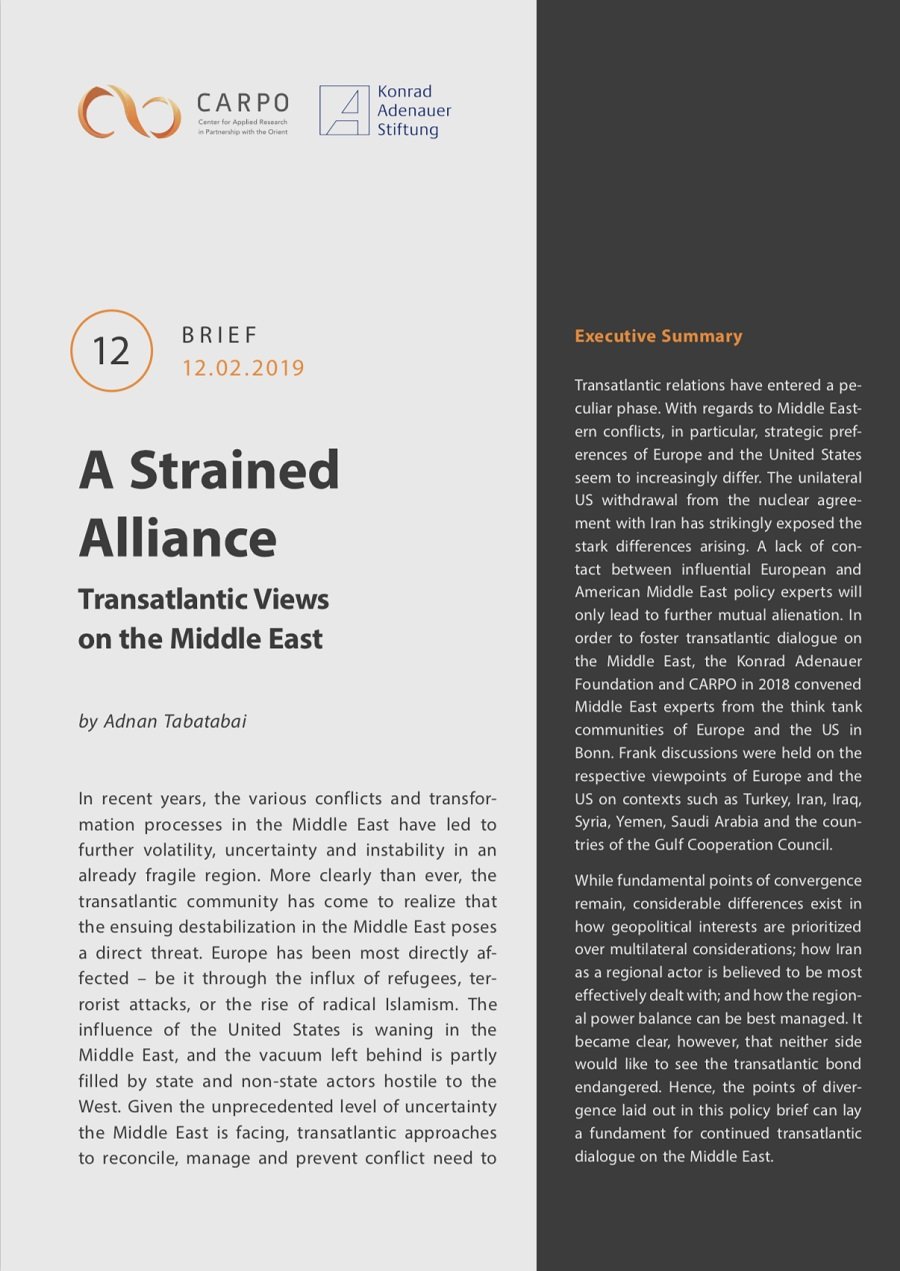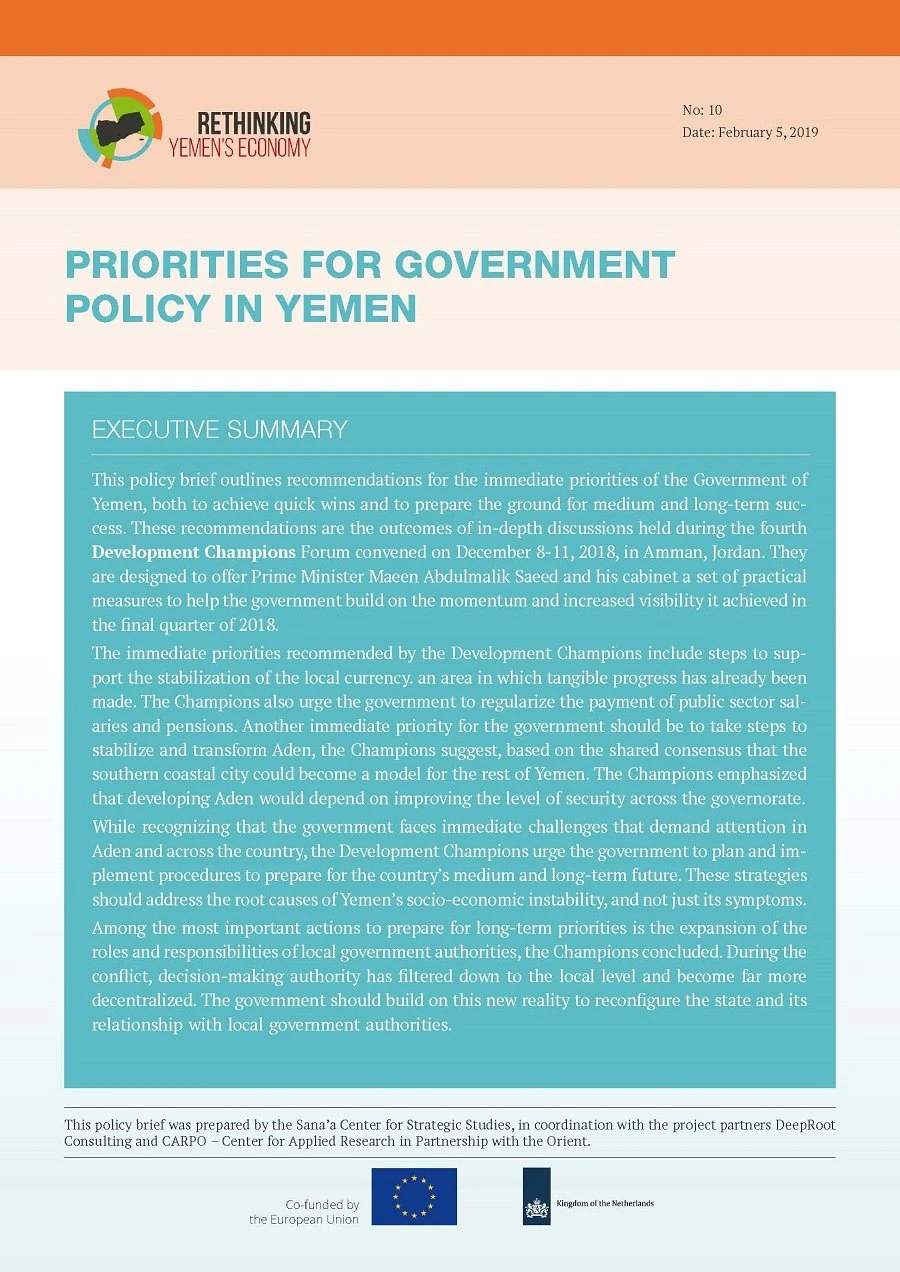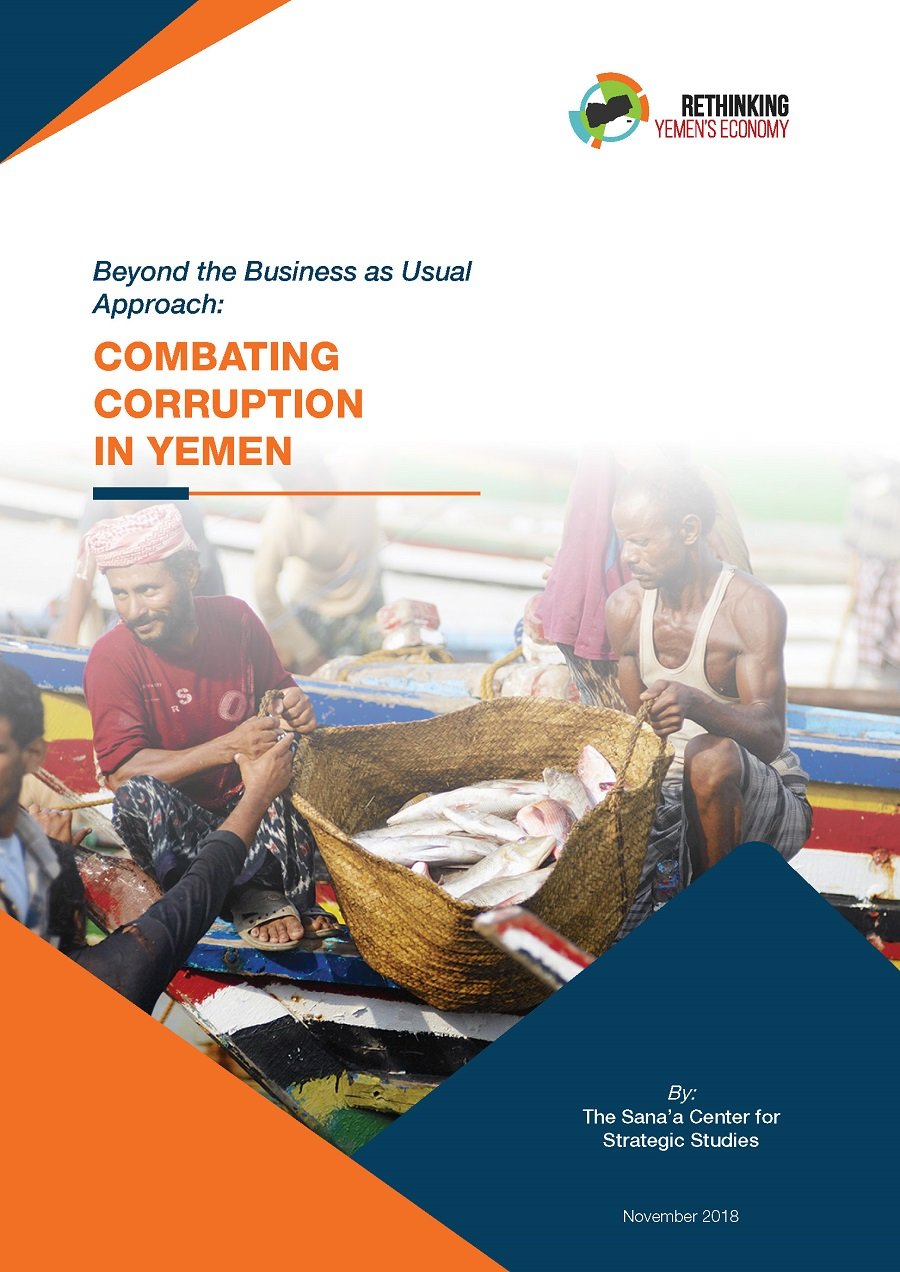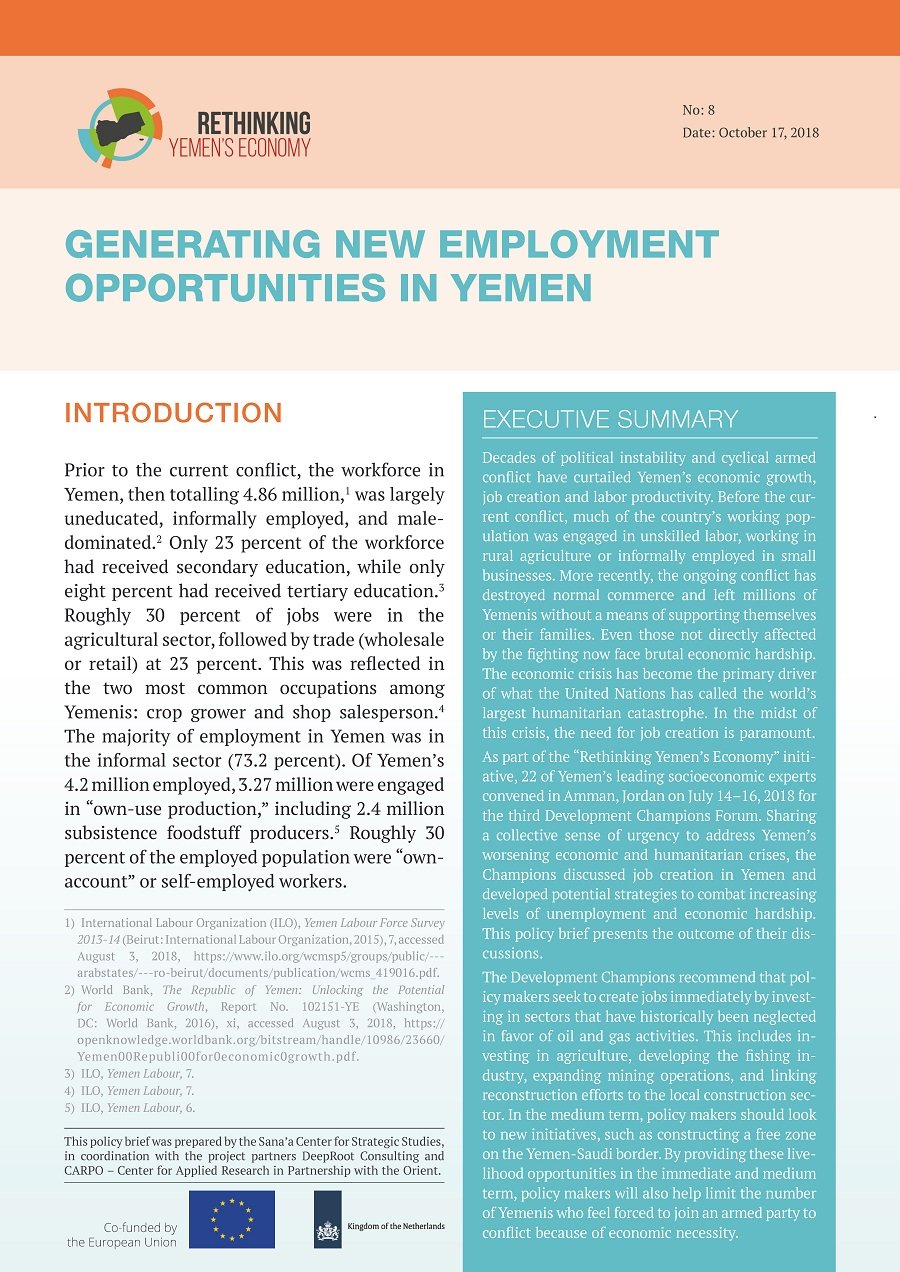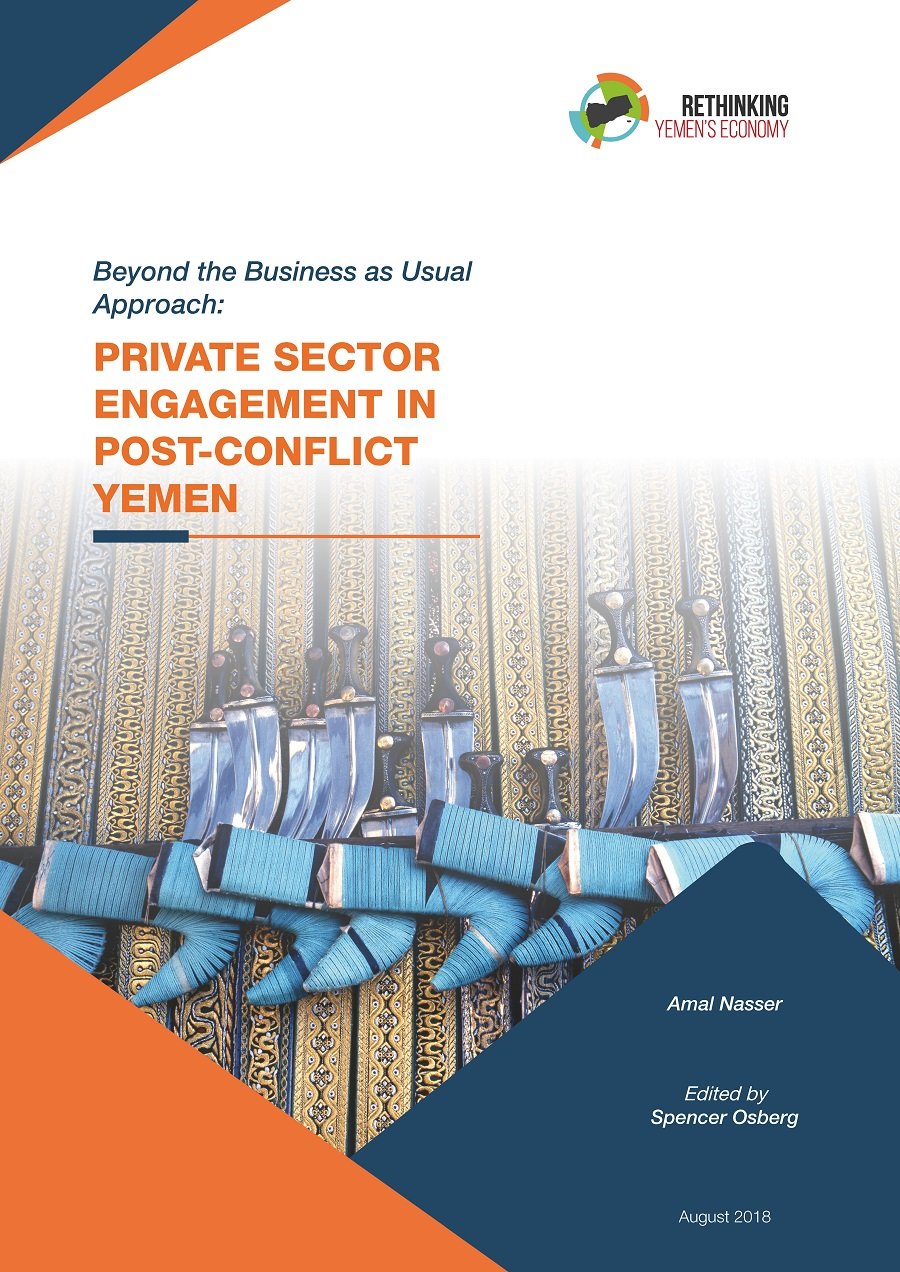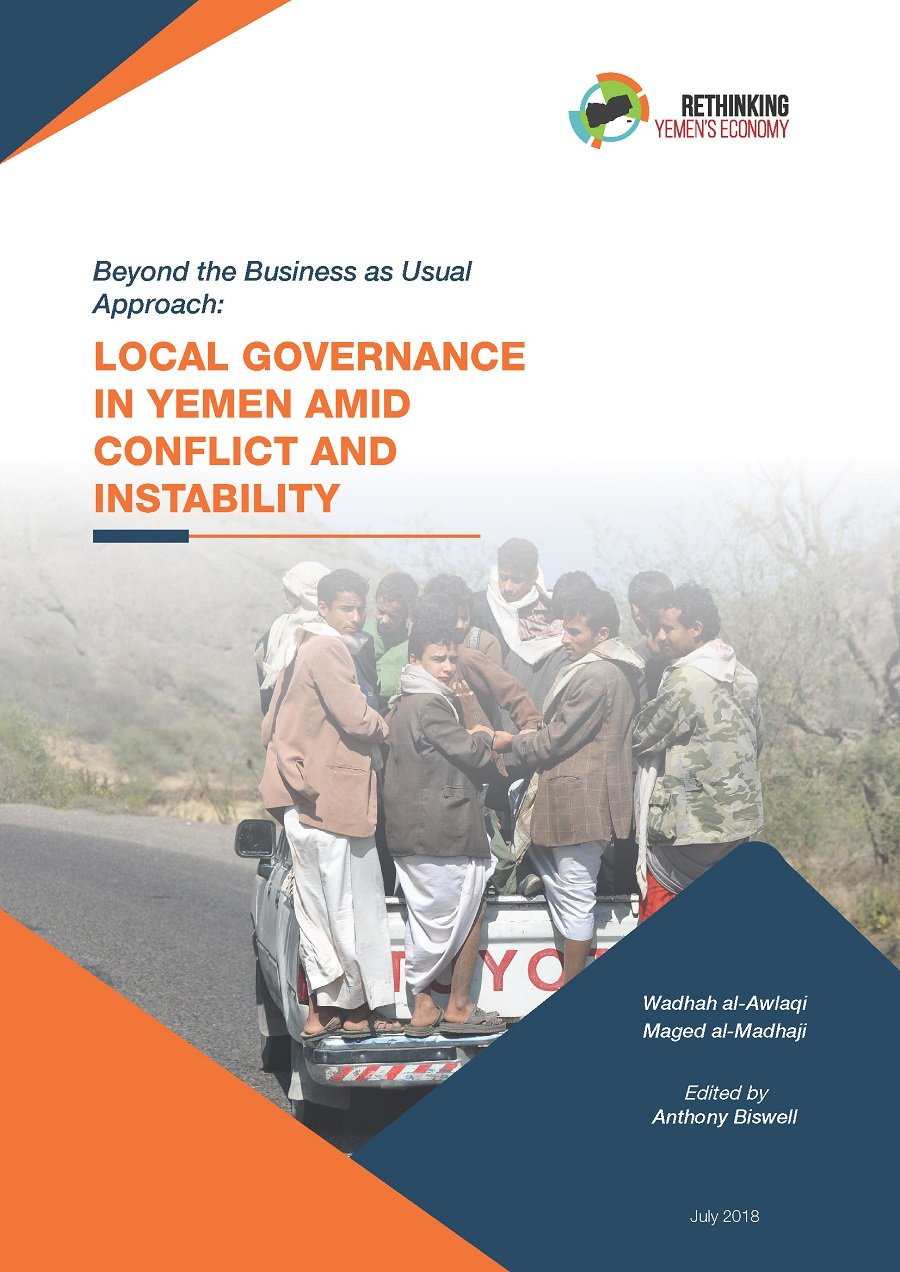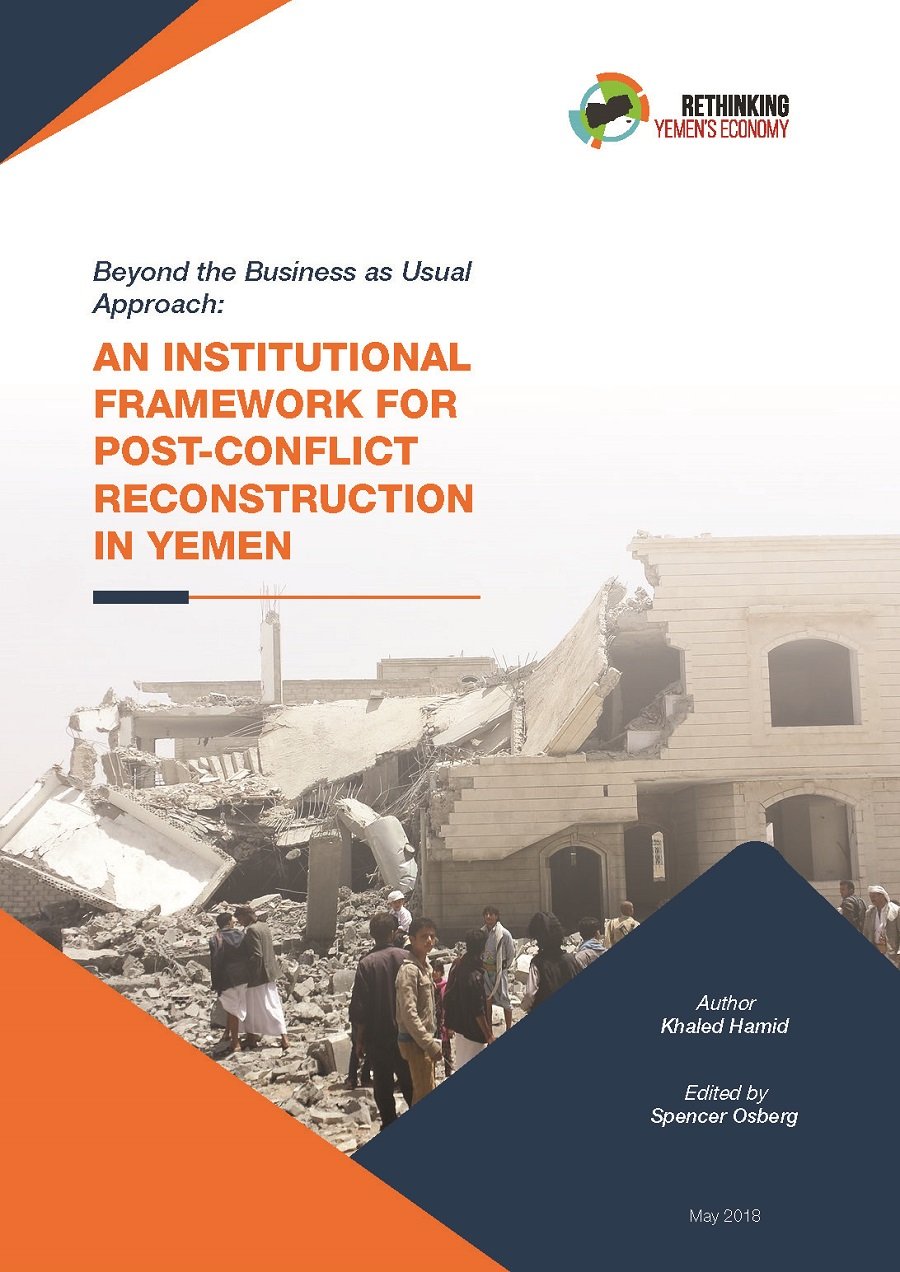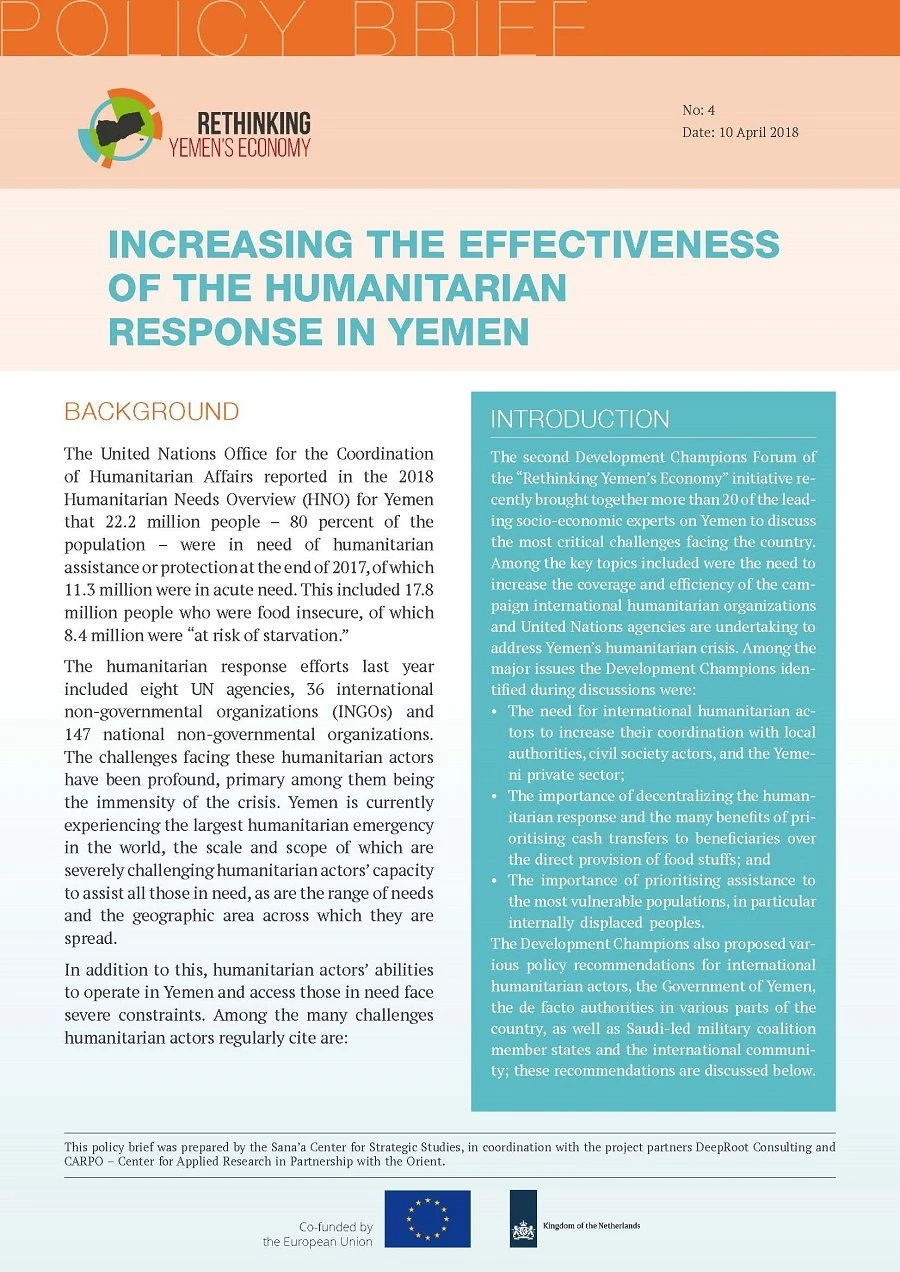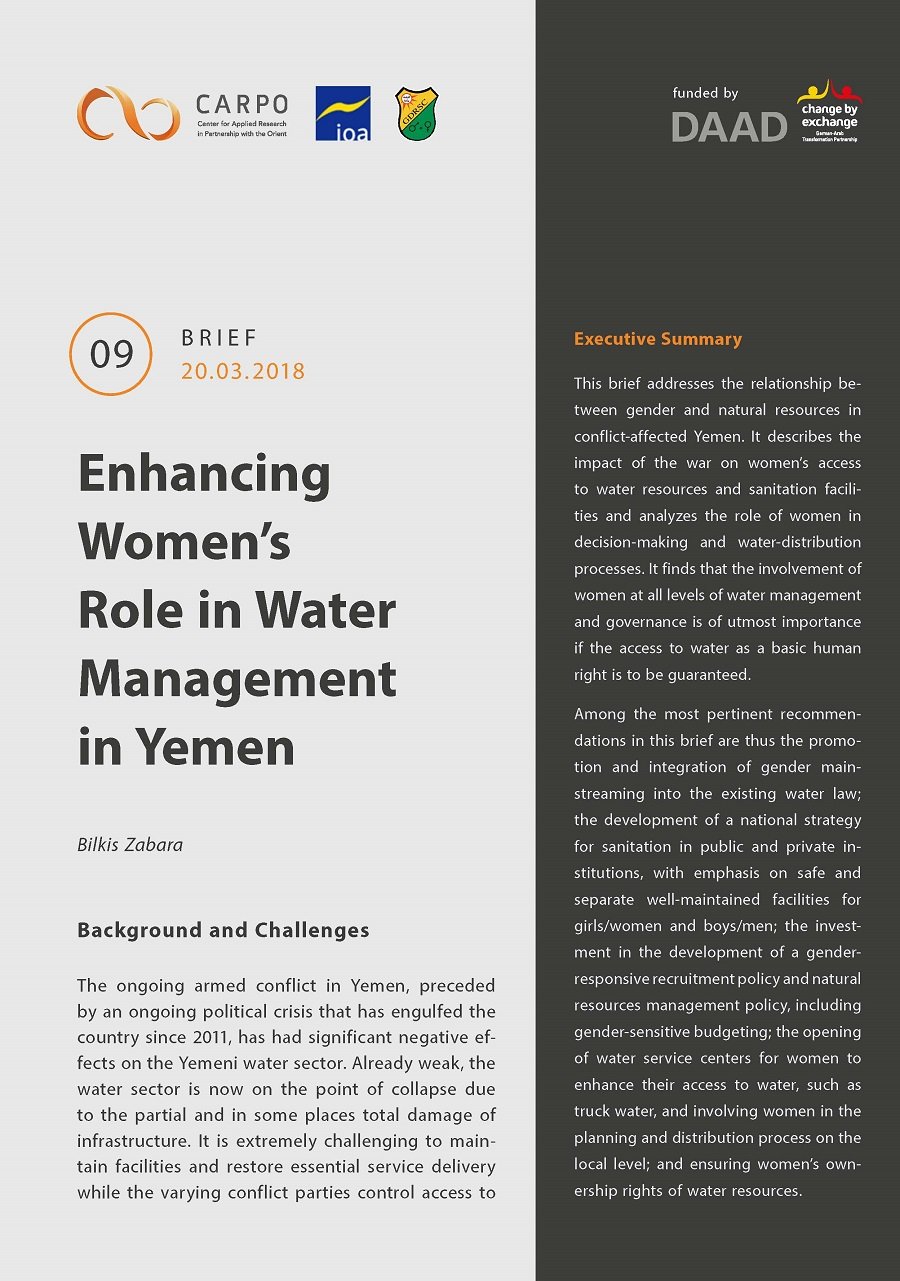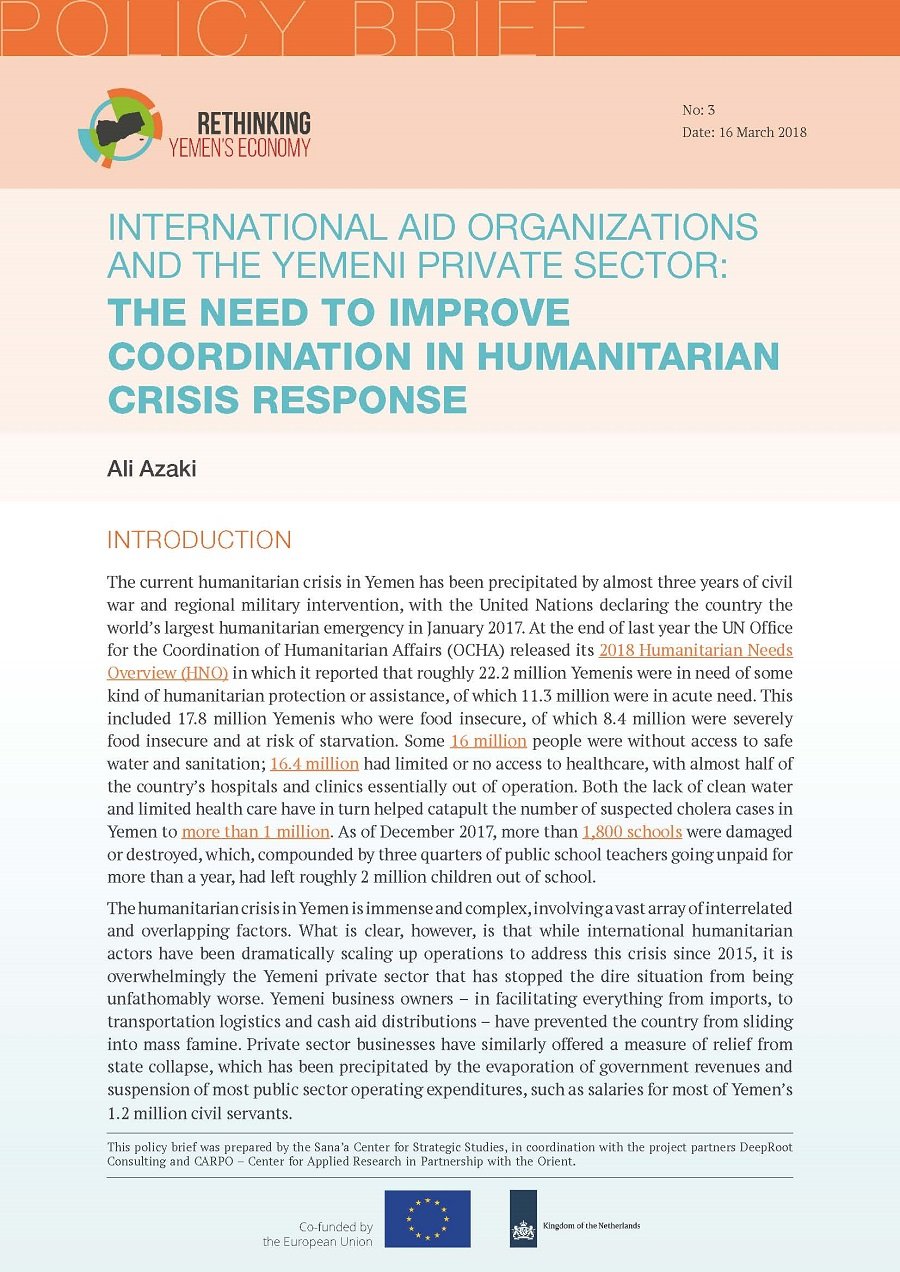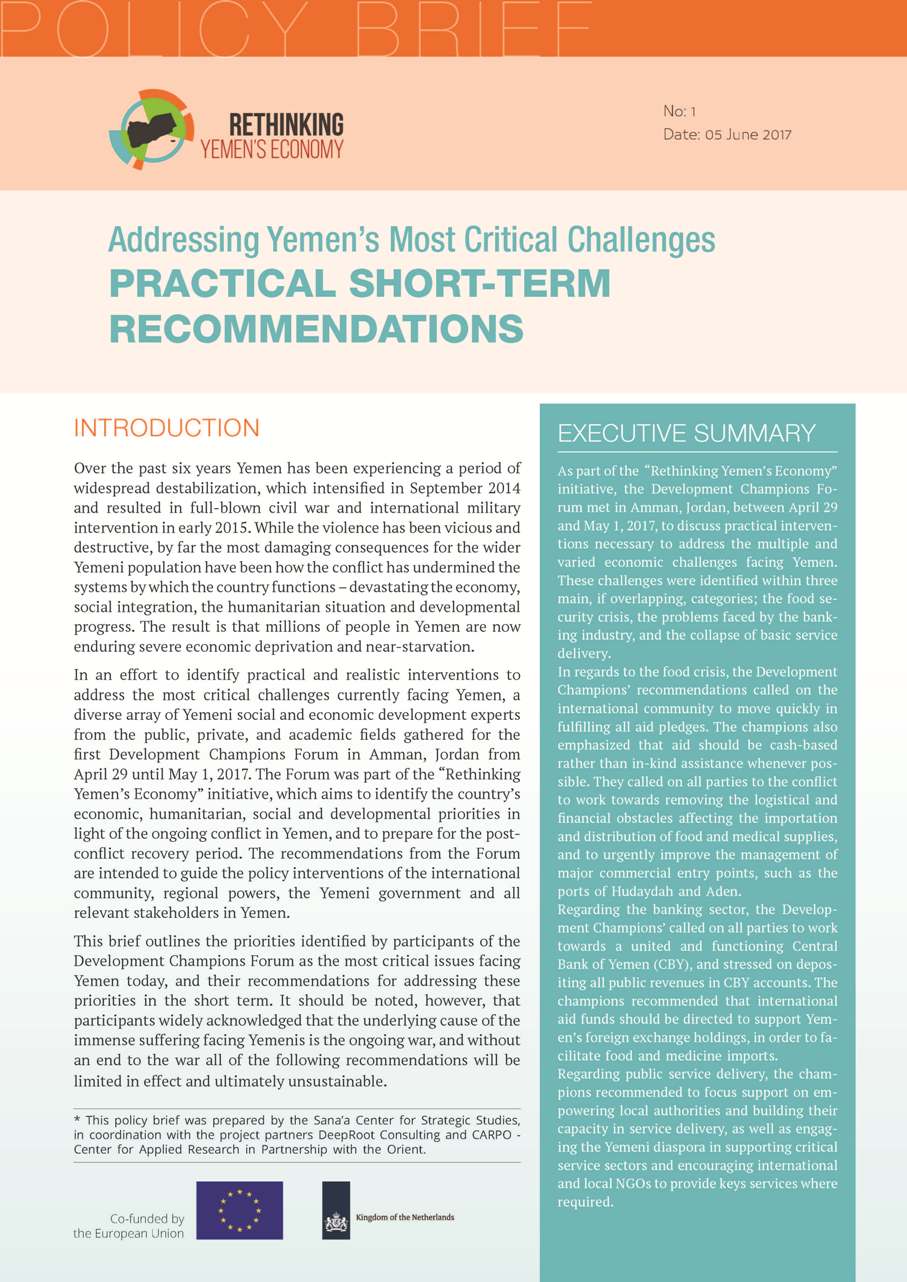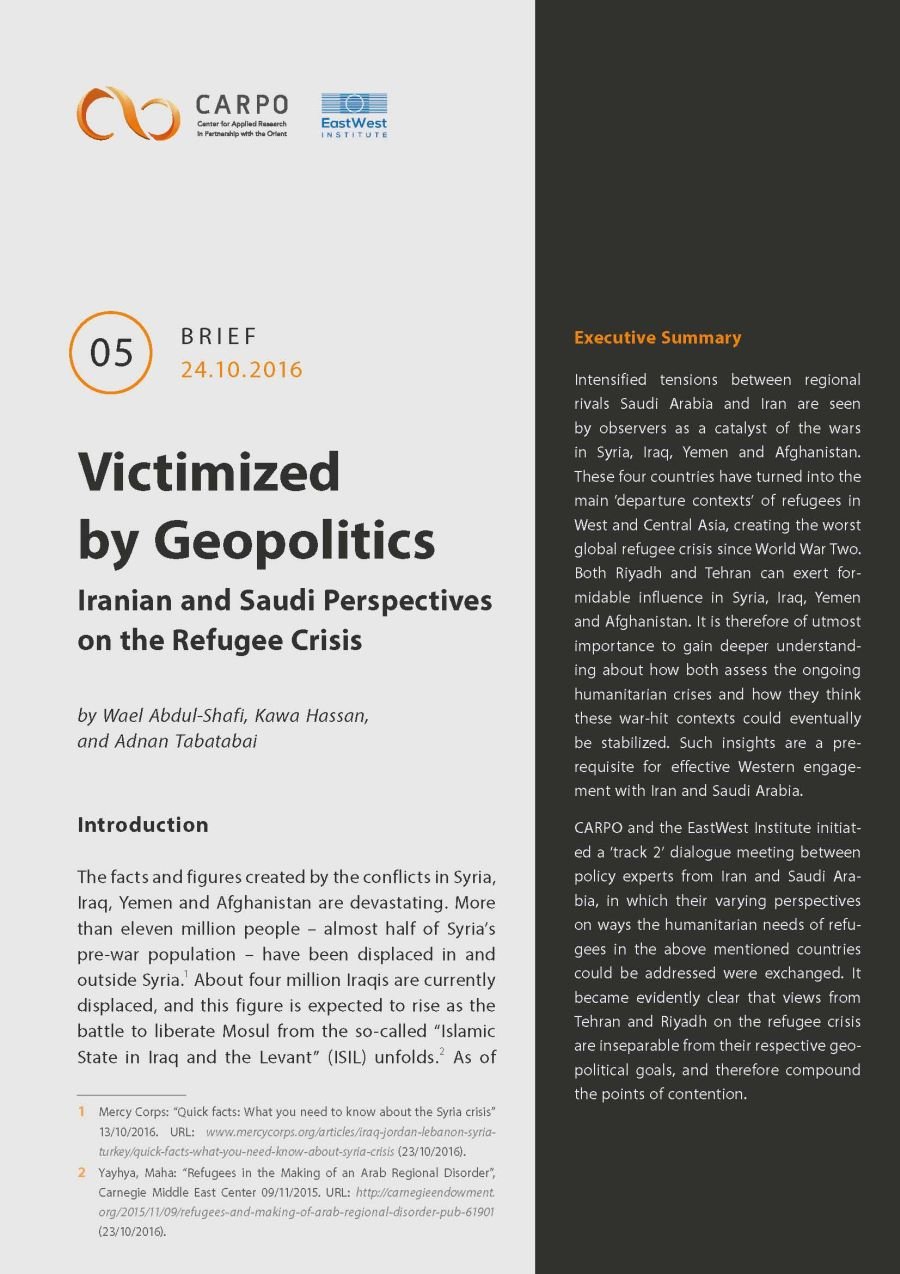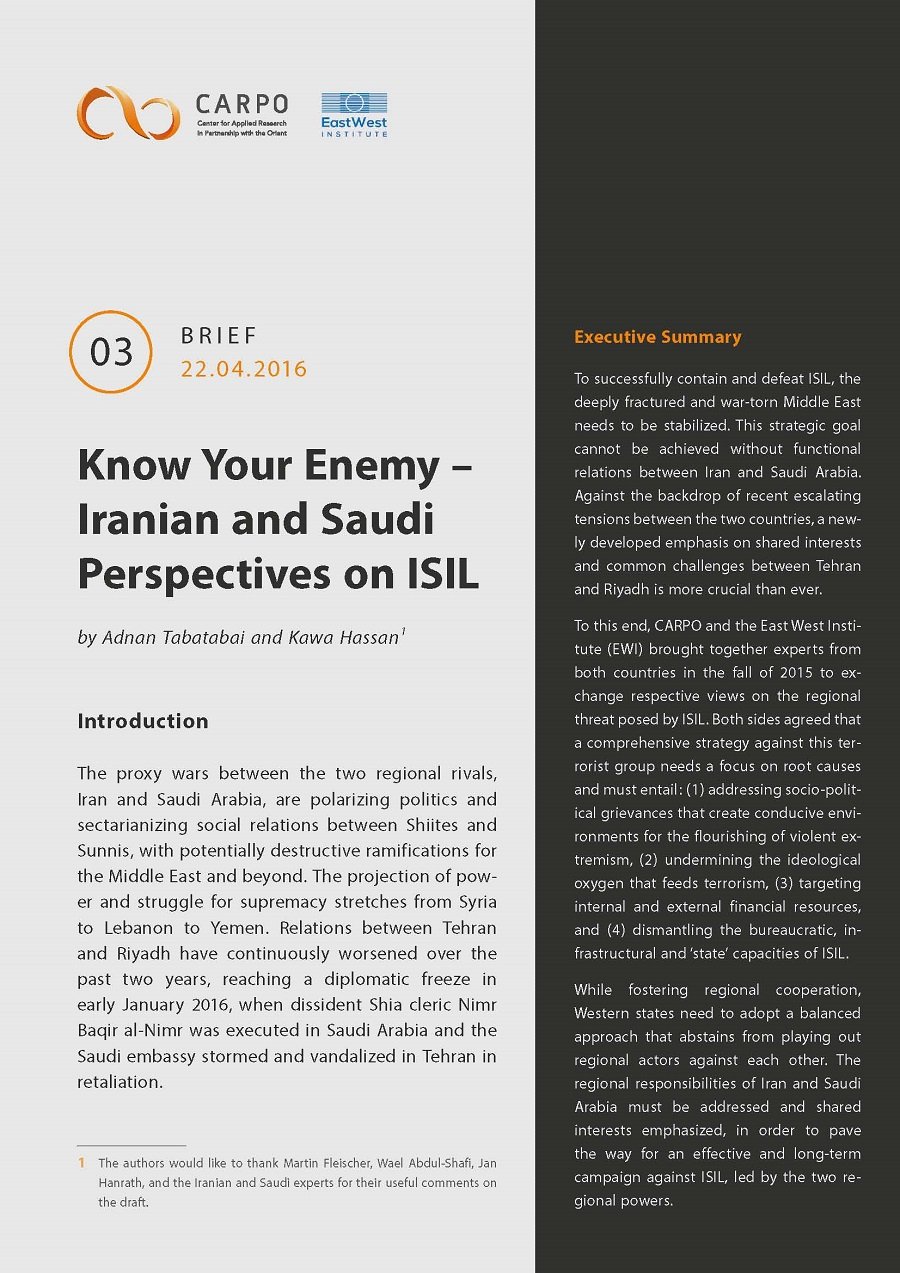Corruption, or the abuse of power for private gain, has been deeply entrenched in the Yemeni political economy for decades. Over the course of the ongoing conflict, however, state capture in Yemen has become far more complex, and new patronage networks have emerged with interests that have extended across national borders and crossed the frontlines […]
Read more...Category: Projects
Private Sector in Yemen
The impact of the conflict on Yemen’s economy and private sector have been calamitous, and, as a result, the economic output has dropped precipitously since its onset. The increased costs for businesses have been spurred by a lack of security and a scarcity of business inputs, while a loss of customer base and demand as […]
Read more...The Essential Role of Remittances in Mitigating Economic Collapse
Scarce opportunities to earn a viable livelihood in Yemen continue to drive hundreds of thousands of Yemenis abroad in search of work, especially to neighboring countries. Over time, remittances from Yemeni expatriates have become one of the most important sources of foreign currency inflows into Yemen and have played an essential role in mitigating economic […]
Read more...Generating New Employment Opportunities II: Labor Force, Labor Market and Expatriates
Decades of political instability and cyclical armed conflict have curtailed Yemen’s economic growth, job creation and labor productivity. Sharing a collective sense of urgency to address Yemen’s worsening economic and humanitarian crises, 22 of Yemen’s leading socioeconomic experts convened as part of the Rethinking Yemen’s Economy initiative to discuss job creation in Yemen and develop […]
Read more...Transitional Government in Post-Conflict Yemen
To maximize the effectiveness of governance in post-conflict Yemen, two options stand out for the composition of an immediate post-conflict government to lead a transitional period in the country. First, a consensus government with cabinet seats divided among the key Yemeni political factions. Second, a technocratic caretaker government appointed by a consensus prime minister. In […]
Read more...Restructuring Public Finances in Yemen
This Policy Brief addresses the issue of public finances in Yemen, which have long suffered from an overdependence on energy exports, one of the lowest tax collection rates in the world, and chronic budget and balance of payments deficits. With the intensification of the conflict in 2015, energy exports and foreign grants were frozen, while […]
Read more...Generating New Employment Opportunities I: Yemeni Labour Market
Decades of political instability and cyclical armed conflict have curtailed Yemen’s economic growth, job creation and labor productivity. Before the current conflict, much of the country’s working population was engaged in unskilled labor, working in rural agriculture or informally employed in small businesses. Sharing a collective sense of urgency to address Yemen’s worsening economic and […]
Read more...The Development Champions
The Development Champions are a group of senior Yemeni experts and professionals from various backgrounds and with established expertise in development and economy. The Development Champions discuss priorities for intervention by national and international policymakers, issue respective recommendations and are thus at the heart of the Rethinking Yemen’s Economy initiative. The aim of this initiative […]
Read more...The Road to Reconstruction
The ongoing conflict in Yemen has imposed grievous costs on Yemenis, damaging lives, property, and infrastructure, and collapsing the country’s already fragile economy. And yet the conflict will eventually subside. Previous reconstruction efforts in Yemen following conflict or natural disaster have suffered from lack of coordination with and unrealistic expectations from international donors, as well […]
Read more...Civil Servant Salaries
The rising wage bill for the public sector is a timebomb that threatens future economic stability in Yemen. The public sector is one of the main employers in Yemen and accounted for 32% of total government spending on average during the period from 2001 to 2014. This very heavy burden on public expenditure calls for […]
Read more...The Need to Reform the Public Sector Wage Bill
This Policy Brief addresses the issue of Yemen’s bloated public sector. Amid consistently large budget deficits, the inflated public sector wage bill is fiscally unsustainable and threatens to undermine economic recovery and future stability in Yemen. Recognizing the multiple challenges of reforming the public sector, even in a stable country, the recommendations brought forward in this […]
Read more...Priorities for Private Sector Recovery in Yemen
This Policy Brief addresses the need for private sector recovery in Yemen and gives recommendations for the improvement of the overall business and investment climate. While the private sector has shown a far greater degree of resilience than the public sector and in many cases stepped in to replace government services, its situation – and […]
Read more...Local Governance in Yemen
Local councils are among Yemen’s most important state institutions. Responsible for providing basic public services to millions of Yemenis, local councils represent official governance and the Yemeni state for vast swathes of the population. The intensification of the conflict since March 2015, however, has undermined the councils’ ability to operate effectively in most areas of […]
Read more...Transitional Government in Post-Conflict Yemen
This Policy Brief offers recommendations to maximize the effectiveness of governance in post-conflict Yemen – whatever the composition or structure of the government. It presents three case studies on government models previously introduced in Yemen, Tunisia and Lebanon after periods of instability. These case studies offer useful lessons on the challenges, risks and opportunities of […]
Read more...Tafahum – An Ideational Fundament for West Asia and the Arabian Peninsula
by Christian Koch and Adnan Tabatabai This CARPO Brief discusses the need to construct ideational pillars for a tafahum, or common understanding, of how to define a process towards regional integration and a shared security architecture for West Asia and the Arabian Peninsula (WAAP). This is an evolutionary process, which begins with the essential building […]
Read more...The Repercussions of War on Women in the Yemeni Workforce
This Policy Brief sheds light on the impact of the ongoing conflict in Yemen on women’s participation in the workforce. It finds that the protracted conflict has, on the one hand, pushed more women into the workforce and new labor markets, in some cases into professions previously dominated by men. On the other hand, the […]
Read more...The Essential Role of Remittances in Mitigating Economic Collapse
This White Paper addresses the impact of Saudi Arabia’s increasingly restrictive handling of its expatriate workforce on the economy in Yemen. The kingdom’s policies, which have forced tens of thousands of Yemenis to return home, have resulted in a dramatic loss of income from remittances for their families in Yemen at a time when the […]
Read more...Reconstruction and Recovery in Yemen
This Policy Brief brings forward the results of in-depth discussions held by the Development Champions with the aim of developing recommendations and guidelines to ensure the reconstruction and recovery of Yemen is a comprehensive, effective process that has a long-term positive impact. The Champions’ recommendations include measures to link immediate humanitarian interventions to Yemen’s long-term […]
Read more...Economic Confidence-Building Measures – Civil Servant Salaries
This Policy Brief brings forward crucial recommendations resulting out of the fourth Development Champions Forum in Amman, held in December 2018. The Development Champions recommend that the Yemeni government resumes salary payments to all civil servants working in the administrative apparatus of the state registered in the Ministry of Civil Service database of 2014 across […]
Read more...Understanding Peace Requirements in Yemen
by Mareike Transfeld & Marie-Christine Heinze This CARPO Report serves as a background paper to five short studies Yemeni-international researcher tandems will develop in the course of 2019. It places a particular focus on ‘peace requirements’, a term that seeks to draw attention to the manifold challenges to establishing stability and building peace in Yemen […]
Read more...A Strained Alliance. Transatlantic Views on the Middle East
by Adnan Tabatabai This CARPO Brief provides the readers with a reflection of the discussions held during a workshop organized by the Konrad Adenauer Foundation (KAS) and CARPO, which brought together policy experts from the think tank communities of Europe and the United States. The focus of the discussions was on specific country contexts (Turkey, […]
Read more...Priorities for Government Policy in Yemen
This Policy Brief outlines recommendations for the immediate priorities of the Government of Yemen, both to achieve quick wins and to prepare the ground for medium and long-term success. These recommendations are the outcomes of in-depth discussions held during the fourth Development Champions Forum convened on 8-11 December 2018 in Amman, Jordan. They are designed to […]
Read more...Knowledge in Dialogue. The Role of Academic Exchange in Mitigating Conflict between Iran and Saudi Arabia
The sixth meeting of CARPO and the EastWest Institute’s ‘Iran-Saudi Dialogue Initiative’ dealt with knowledge production and knowledge dialogue in context of the highly conflictual relationship between Iran and Saudi Arabia and explored the potential of academic exchanges and scientific cooperation in defusing such tensions.
Read more...Combating Corruption in Yemen
This White Paper assesses the multifaceted pervasiveness of corruption in Yemen. It is demonstrated, amongst others, that patronage networks are now emerging among previously marginal or unknown figures and that the financial involvement of Saudi Arabia and the United Arab Emirates has extended patronage across national borders. It is argued that any anti-corruption agenda must […]
Read more...Generating New Employment Opportunities in Yemen
This brief brings forward crucial recommendations to address Yemen’s worsening economic and humanitarian crises. These recommendations result from the third Development Champions Forum, which took place in Amman, Jordan, between 14–16 July 2018 as part of the “Rethinking Yemen’s Economy” initiative.
Read more...Private Sector Engagement in Post-Conflict Yemen
This White Paper assesses the factors weighing on private sector development in Yemen. It lays out the impacts of the 2011 uprising in Yemen, the ensuing political crisis and the current conflict on the economy and the private sector. Following this, recommendations are offered to both the Yemeni government and international stakeholders regarding steps that […]
Read more...Local Governance in Yemen Amid Conflict and Instability
This White Paper deals with the role of local councils in Yemen and analyses their current situation. In the absence of central state authority and despite all the challenges they face, these councils remain important instruments for coordinating humanitarian relief efforts and local-level conflict mediation. Local councils are among the best-equipped and best-established institutions to […]
Read more...RYE: An open letter regarding Hudaydah
The Yemen Development Champions discussed the latest developments in Hudaydah governorate while convening for the latest Development Champions Forum. The Champions are concerned by the impact of escalating military operations on the humanitarian situation in Yemen as a whole and Hudaydah governorate in specific; in addition to the damage that would be caused to vital economic infrastructure. The effect on the economic situation in the country would be catastrophic. Hudaydah governorate is the third most densely populated governorate in Yemen and has more than 36,000 economic facilities. It is home to the most important port in the country, through which the majority of goods and humanitarian aid are brought into Yemen.
Read more Read more...An Institutional Framework for Post-Conflict Reconstruction in Yemen
This White Paper proposes an institutional structure for a future reconstruction process in Yemen: a permanent, independent, public reconstruction authority that empowers and coordinates the work of local reconstruction offices, established at the local level in areas affected by conflict or natural disasters. This proposal does not arise only from lessons learned from previous reconstruction […]
Read more...Increasing the Effectiveness of the Humanitarian Response in Yemen
This brief brings forward recommendations to enhance the effectiveness of the humanitarian response in Yemen. These recommendations result from the second Development Champions Forum, which took place in Amman, Jordan, between 14–16 January 2018 as part of the “Rethinking Yemen’s Economy” initiative.
Read more...Enhancing Women’s Role in Water Management in Yemen
This brief addresses the relationship between gender and natural resources in conflict-affected Yemen. It describes the impact of the war on women’s access to water resources and sanitation facilities and analyzes the role of women in decision-making and water-distribution processes
Read more...International Organizations and the Yemeni Private Sector
This brief addresses the role of the Yemeni private sector in mitigating the humanitarian crisis in Yemen as well as its relationship to international humanitarian organizations. It finds that a large number of Yemeni business owners have been engaged in trying to alleviate the suffering of Yemenis out of their own volition, but also in service of and cooperation with international humanitarian agencies.
Read more...Restoring Central Bank Capacity and Stabilizing the Rial
This brief brings forward crucial recommendations to address Yemen’s current challenges in the financial sector. These recommendations result from the second Development Champions Forum, which took place in Amman, Jordan, between 14–16 January 2018 as part of the “Rethinking Yemen’s Economy” initiative.
Read more...Environmental Challenges in a Conflictive Environment. Iranian and Saudi Perspectives on the Risks of Climate Change and Ecological Deterioration.
The fourth meeting of CARPO and the EastWest Institute’s ‘Iran-Saudi Track 2 Initiative’ dealt with the political, social and economic risks posed by current environmental challenges to Iran and Saudi Arabia alike. The workshop brought together academics, environmental experts, security analysts and former diplomats from Iran and Saudi Arabia as well as international experts.
Read more...Addressing Yemen’s Most Critical Challenges. Practical Short-term Recommendations
This brief summarizes the short-term recommendations to address Yemen’s current most critical challenges in development and economy which resulted from the first Development Champions Forum. This Forum took place in Amman, Jordan, between April 29 and May 1, 2017 as part of the “Rethinking Yemen’s Economy” initiative.
Read more...Envisioning the Future: Iranian and Saudi Perspectives on the Post-Oil Economy
The third meeting of CARPO and the EastWest Institute’s Iran-Saudi Track 2 Dialogue Initiative was dedicated to the repercussions of changing global energy markets on Iran and Saudi Arabia. The workshop brought together policy experts and economists from Iran and Saudi Arabia as well as experts from Europe.
Read more...Victimized by Geopolitics. Iranian and Saudi Perspectives on the Refugee Crisis
The second meeting of CARPO and the EastWest Institute’s Iran-Saudi Track 2 Dialogue initiative took place in spring 2016 in Bonn. Current and former diplomats, analysts and security experts from both countries met alongside European scholars and experts to discuss “Iranian and Saudi Perspectives on the Refugee Crisis”.
Read more...Returning to Transitional Justice in Yemen. A Backgrounder on the Commission on the Forcibly Retired in the Southern Governorates
This report focuses on the work of the Commission on the Forcibly Retired in the Southern Governorates, which was established in the framework of the GCC Initiative. The author argues that if the unity of Yemen is to be preserved, the only path forward is to take concrete and earnest steps to rebuild trust between North and South through transitional justice, once the ongoing war has come to an end.
Read more...Know Your Enemy – Iranian and Saudi Perspectives on ISIL
CARPO and the EastWest Institute have established a confidential track 2 format for Iranian-Saudi dialogue. The first dialogue meeting took place In the fall of 2015 in Brussels. Current and former diplomats, analysts and security experts from both countries met alongside European policy-makers and experts to discuss “Iranian and Saudi Perspectives on ISIL”.
Read more...

